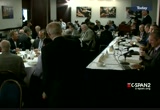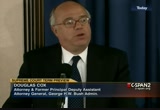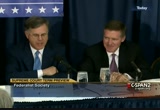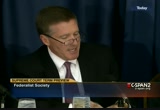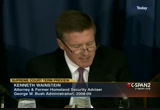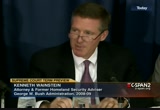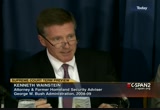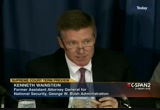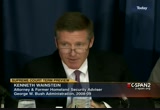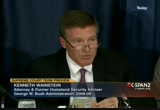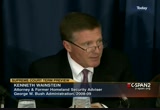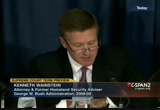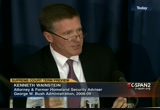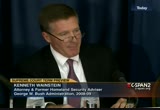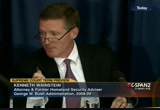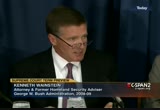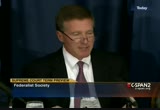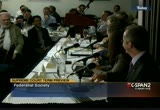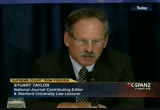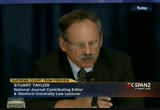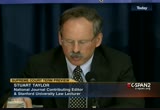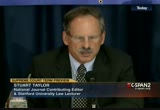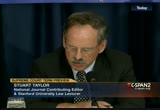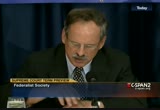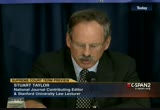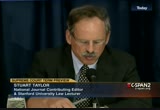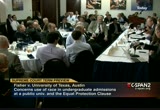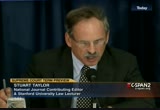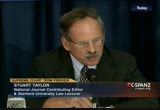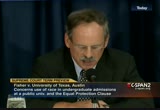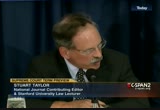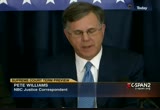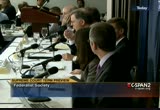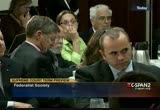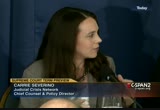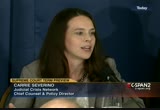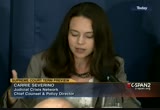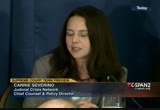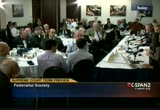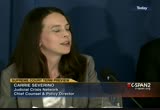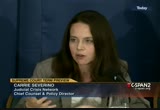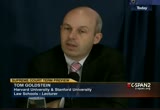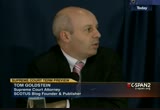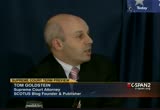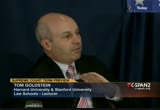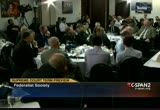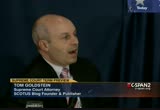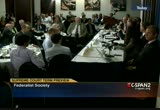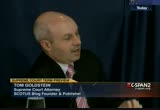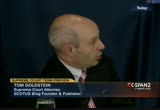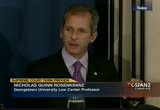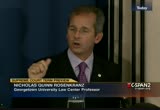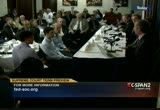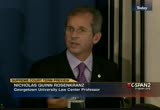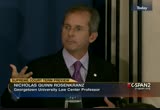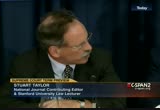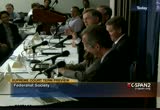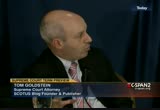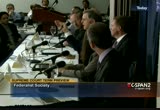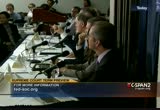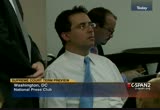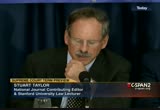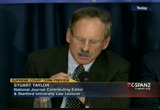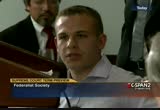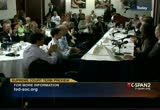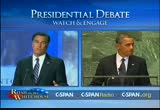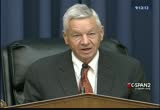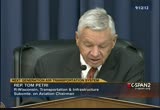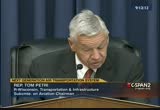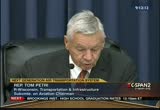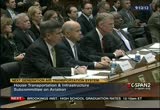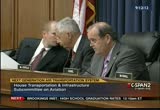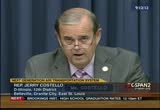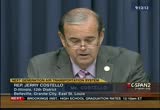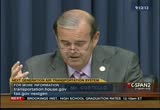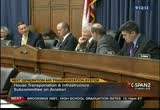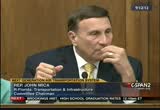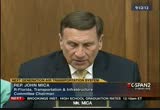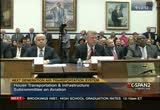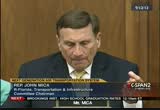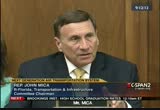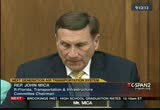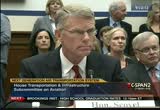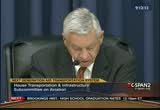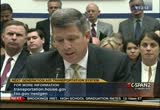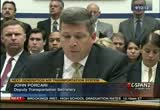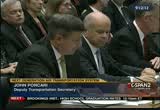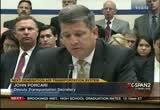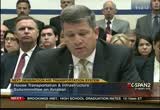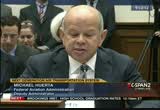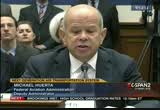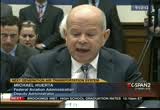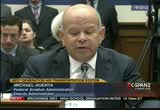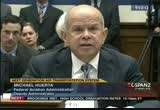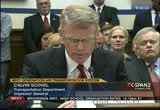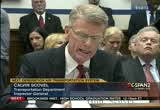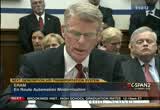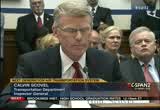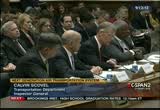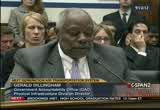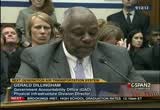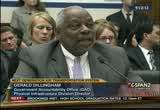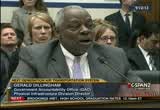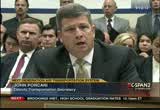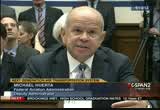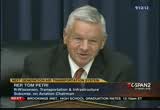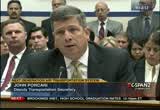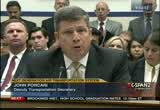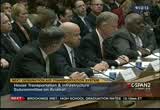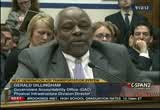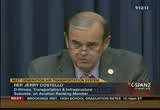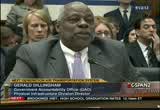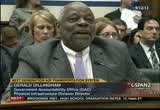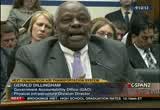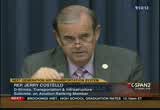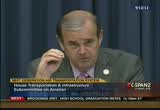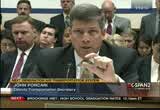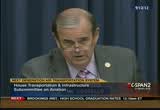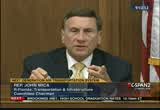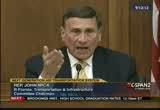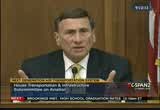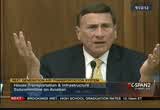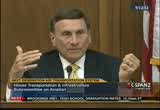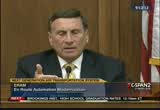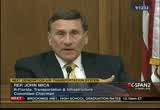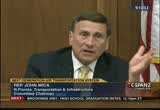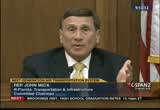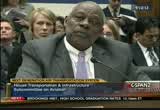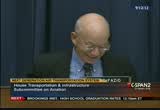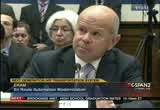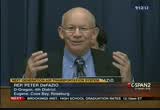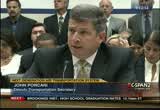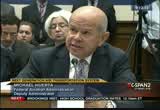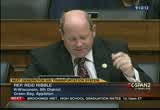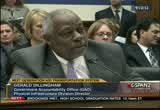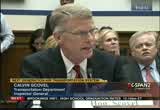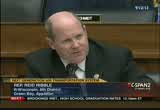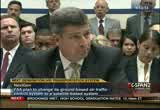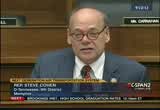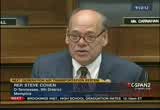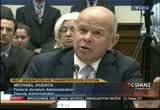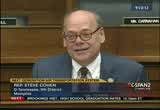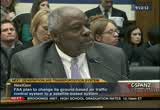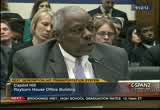tv Tonight From Washington CSPAN September 27, 2012 8:00pm-11:00pm EDT
8:00 pm
8:01 pm
first oral argument for the new term on many. this is an hour and a half. [inaudible conversations] [inaudible conversations] >> good afternoon. good afternoon. i am doug cox and on behalf of the federal society welcome to our september luncheon. today's event is sponsored by the societies practice groups, the d.c. lawyers chapter and the faculty division. our program today is the little a little different from the regular lunches at the waist down in chinatown. for example there is no congo on the menu that-somethings but some things are more pardoned than chinese food no matter how yummy. the new supreme court term promises to be one of those very
8:02 pm
important things so we have pulled together and all storm panel of experts to give us their thoughts and insights. our moderator today is pete williams nbc news justice correspondent. among his many other comp which meant he is well-known for being one of the first journalist along with his colleague dan abrams to get the reporting right on that long-ago december evening when the decision came down in bush versus gore. we are grateful he is here with us today to lead the discussion. spierer panelist has -- so i will refer introduce each one as they speak. playboy magazine has just declared the university of virginia america's top party school but if it was like that when ken wainstein graduated from uva he has spent his career making up for by it by getting very serious. >> i was in the library the whole time. federal prosecutor in new york u.s. attorney in washington,
8:03 pm
chief of staff to the fbi director robert mueller. in 2006 he became the first justice department lawyer to fill a brand-new position position assistant attorney general for national security. event served as the homeland security adviser to president george w. bush and is now in private practice and watching 10. can, please. >> it's dangerous to be on a panel that starts off with a reference to "playboy" magazine but i will see if i can catch my breath and go for. thanks very much and it's good to be here. i've been asked to talk about three cases. one is against a national security case and the two more regular criminal cases. let me start with the national security case and that is called proper versus fantasy generational. it is a standing case relating to a challenge to what is called the fisa amendment act. the fisa amendment act was passed in 2008 and it was an amendment, very substantial mimic of the foreign intelligence surveillance act passed in 1978 and understand
8:04 pm
the standing issue, you have to understand the merits a little bit. >> for those watching on c-span what is standing? >> standing is the question of whether a party actually has the right to appear in court and to challenge in this case to challenge the statute. just to get ahead of things, the plaintiffs here are attorneys, civil rights activists and others who are in regular contact with people overseas particularly people who might well be the subject of electronic surveillance by the federal government and they are challenging the law that allows electronic surveillance, this wiretapping because they're concerned that their case will be picked up. they're claiming to have standing to challenge this law because even though the surveillance might be directed overseas to people they're talking to get their dedication will get picked up in the course of that surveillance and so therefore they have the right to challenge it in court. that is the standing issue we we are dealing with. just to get to the merits for a
8:05 pm
minute, and the aftermath of the exposé in the mid-70's about various abuses in the intelligence community and in short in short is set up a system by which the executive branch would have to go to the court surveillance court here in d.c. and get permission when they wanted to do wiretapping for national security purpose to give sworn intelligence information. this is way of making sure that the court, there was a court that had to check and had a role in reviewing the government's effort to do this wiretapping which they ended up using in in the password it hadn't been in any court ruled. the problem with the statute as it was designed back in 1978 is that congress tried to limit it so that it focused on communications inside the united states and it was designed in a way that it didn't require going to the court and the national security agency or others who
8:06 pm
are trying to wiretap people outside the united states. the problem is that in defining the parameters of what communications would require and what surveillance is required and which ones didn't the statute referred to the technology of the time as communications that were wired in communications over radio, the satellite technology. the problem is in 1978 we see a dramatic change in technology of communications and in particular fiber-optic cables all over the world which is actually very much changed the routing indications that change the requirement, the court order requirements they face when they try to get into electronic surveillance in the result of that is that leading up to 9/11 there are many instances where the government would have to go to the fisa court to get an order from the fisa court for the could electronically surveilled or wiretap someone overseas and that was not the intent of fisa.
8:07 pm
the intelligence surveillance act the amendment act, the fisa amendments act of 2008, what it did was to set government is trying to surveilled someone overseas and they have reasonable basis to believe that person is overseas and not in the night they think don't have to go to the court to give special commission -- permission to use that surveillance. that is what was radically different from the 2008 statute, to allow the government to go forward with medication surveillance. number of people having to get special permission for each and every communication. the problem of course is people like the plaintiffs in this case, that meant their communications might get swept up as well even though they were in the united states because they were communicating with someone outside of the state and they would get picked up in the surveillance is. the merits will be thought out maybe some day but there are a couple of questions here as to
8:08 pm
whether not there is a -- to the work climate in the fisa court review and if there is that is still an issue in the supreme court has not ruled on that and then whether or not the communication even if they are served torre whether it's reasonable, whether it's reasonable to wait is conducted. those are the narratives. as i said the issue is one of standing. the plaintiffs say they are standing because they are being incidentally wiretapped because there are communicate with people overseas and out of concern for that care having to travel to meet these people in person so as to avoid being intercepted and therefore spending money, having to go travel and it's killing the recommendation because there is a concern that what they say to their clients or others overseas might get picked up. that is the entry injury that they claim that they have. the government says that injury is really illusory. it's no different than maybe an
8:09 pm
attorney for a mafia crime family who will say, who will challenge the criminal wiretap statute because of the concern that their mafia clients might be wiretapped and they might get picked up in those wiretaps. the same thing, you have no direct challenge and otherwise valid communications, electronic surveillance because you might get -- that is the standing issue. the government says there is no standing and there is no entry by the fact that they could say that it would allow them to go to court. the state fair play here are the following. one, obviously if standing is found and go forward and prevail and litigation finds the fisa amendment act unconstitutional that would undermine a very -- effort. it is up for reauthorization this year and the attorney general filed letters letter saying it's an enormously
8:10 pm
important tool in the effort against terrorists and other foreign threats. a second concern is that if they find standing in this case, that would probably lead to other challenges by people who have lesser injuries to be able to cite that would mean in more cases would come to court where the intelligence programs are being challenged and secrets about those intelligence grams would undermine national's gritty. i guess the last issue that, and the most probably global important that if standing is found in this case that it's more likely similar cases would be brought to the courts and more likely that judges as opposed to legislative executive branch would be resolving some of these policy issues about the lines that should be drawn around our intelligence programs and there would be a dramatic shift in separation of powers and is probably the thing that
8:11 pm
would be in the forefront of the minds of the justices when they decide this. that is the national security case so i have got to criminal cases they want me to briefly mention just to sort of round out the criminal docket for this year. one is called bailey versus the united states, the fourth amendment case fairly straightforward. the question here is the extent of the ruling in 1981 supreme court case called michigan versus sommers. that is basically sevellon force nation-states coday search warrant at a premises and there is an argument in the premises they can detain the occupants during the time of the search warrant. the issue here is whether that rule extends to somebody who walks out of that residence right before the search warrant is executed and the police follow that person some distance and stopped a person away from the premise is. in this case what happened is you had a defendant, i'm sorry an informant who police say
8:12 pm
there was drug dealing at a certain location in the police got a search warrant and they went in surveilled the house right before they executed a search warrant, saw a man fitting the description of the person the defendant, the informant had said was the drug dealer operating out of that location. that man left with another man and god in the car in trouble when the police followed him a mile and then stop him. he made statements connecting himself to the premises and had a key to the premises. the police brought him back to the premises and the search had been conducted until officers found drugs and guns and no patient and placed him under arrest. he moved to suppress the evidence that was seized in the house. claiming he was stopped illegally and found summers applied and the rule apply to people who are found on the premises and certainly played to people who are mile away. the argument, just look at the rationale of summers opinion and
8:13 pm
the justifications that were cited therefore police having the authority to pay people who are on the location for the search warrant and those are the police, keeping people who are on the premises from distracting the police while they do the search and also keeping people from fleeing. the petition here says wait a minute, those don't apply here. there is no danger to the police. we have driven away. we could not distract the police while they were conducting a search warrant because we have driven away and you don't have to worry about flight because we didn't even know the search warrant was happening. the governments response is no, in this day and age everybody has a cell phone. couldn't have -- could've got the text or call and could've turned around. there is affairs and officer safety concerns and the same concern about disrupting the search because they could have come back and gotten in the way of the search and so the
8:14 pm
government is advocating a rule that so long as they stop the person as soon as reasonably practicable after the person leaves the residence, the rule of summer still applies and they can stop them. the significance of this course is that what the government is proposing is the further extension of the ability to tape someone in the incident of the search warrant. just as we have seen in the reverse, an expansion of their right to search is in the same thing in this area. the final footnote though despite the apparent victory for the defense if they win because even if they win on went on the summers issued the government can still argue the stop of the defendant was a legitimate kerry stuff and they had a reasonable suspicion to stop him and it is therefore valid than the evidence of chained would still be -- admissible. now i will talk about maryland
8:15 pm
maryland -- a case where a search has not been granted. >> what i did take a minute and a half on a. >> all right. maryland versus king is a case that surreptitiously is pending and this is another fourth amendment case that the question here is the validity of the state and federal laws that allow for the collection of swabs of sales from the inside of the mouth of the people who have been arrested. there are 27 states have believed that the federal government has laws allowing officers to swap the inside of the mouth of anybody who gets arrested and that swap gets profiled and gets put in a system the system where can help identify the person who is there for that charge but also could possibly other crimes hurt in this case in maryland the defendant, king who was arrested for burglary, was swathed in that swap is checked and checked and came back as a hit to an old rape case that have been installed and he think its it's
8:16 pm
charged with the rape and gets convicted and sentenced to life and imprisonment for the rape. he challenged to suppress the swab and the results of the swabs in connection with the rape and the court of appeals ultimately found it should generally suppress. thereby invalidating the law in maryland which is the school law and 26 other states allowing the swapping of people who are arrested. not people who are convicted of people who are arrested. they did a balance of the defendant's privacy versus the government. in terms of the defendant's privacy, how intrusive is it to take a swab of the mouth versus fingerprinting which is well accepted. and they also focused on the maryland court of appeals on the concern that this process subjected the defendant to having his dna profile and
8:17 pm
genetic traits be exposed to the government and that was particularly interested kind of search that shouldn't be allowed. the state responded that now we have, the defendant's interest privacy interest is not that strong and intact they don't even, when they do a dna profile they don't determine anything about the person and they just get a profile and match it to other samples. the government also is arguing that besides the fact that the government interest is not that strong to government institutions very strong. they need ability to identify the person who has been arrested on the case that he is charged with but also the ability to get those swabs to balance that off the dna database there around the country that has sold the other dna samples to see whether other crimes, this person committed other crimes. that is essentially the argument. it looks like -- will be granted
8:18 pm
and that is a prediction and the stakes are high here too because that process is tremendously important both in finding people and incriminate me for crimes but also exonerating people for the crimes that they did not commit. >> ken, thank you very much. if you not not run into with commentary better -- by are next panel you don't get out much. stuart taylor has written about legal affairs for virtually every big-name publication that is printed on glossy paper and held together by staples. he is a princeton grad and his law degree from harvard and sometimes practices what he preaches as a lawyer. he is one of the first to warn against the rush to judgment and the duke lacrosse case and wrote a book about it and now he is in a book about affirmative action which is an issue the supreme court will be taking up with this term called mismatch, how affirmative action hurts students is intended to help in why universities won't admit it. it's a great time to summarize the entire book and the title. he is co-author of --
8:19 pm
he and his co-author have filed a friend of the corporate cannot affirmative action case of stuart and you start with one? >> could. fortune when my assignment includes the same crazed -- case i've written a brief in which requires the confession of bias but helps me with a homework. the case is the university of texas the first affirmative action case the court has heard since 2003 which will be argued on october 10. i will also spend a minute on fans versus ball state university which is a workplace harassment case. we argue in the amicus brief and i should briefly disclose that rick sandra and i, that black students are often and hispanic students are often harmed bi-racial preferences by the academic environments without warning, where they are ill-prepared to compete with some of the most competitive
8:20 pm
students in the country. we also argue that under principles previously established by the supreme court, the university of texas racial preference system that is an issue in this case is unconstitutional though i think there are respectable arguments both ways on that and i think the reason that i think fisher is a good debt to become the most important affirmative action case ever, it is simply the change in composition of the court's anti-affirmative action case in 2003, the university of michigan case, notably the one on the university of michigan law school's affirmative action preference plan. the court split 5-4 opening the door fairly wide as long as things are holistic, fairly wide preferences and has served as a model for universities around the country at every level,
8:21 pm
medical school, law school, undergraduate school, to entrench and even expand fair use of racial preferences even though reported to lay down principles that would restrain the use of racial preferences. the reason we think that they won't just say kruetter texas wins is mainly that justice sandra day o'connor who wrote the opinion, it was 5-4, retired in 2005 and is replaced by justice alito, who clearly is a vote against racial preferences in most if not all cases. so now we have four solid votes in favor of racial preference. four solid votes we think are probably against racial preferences in the more conservative justices and justice kennedy who sits as in so many cases write the middle. in the kruetter case, kennedy joined the majority on one and critical points.
8:22 pm
point. the point was that racial diversity has educational benefits that are substantial enough to make it a compelling interest that there is a compelling interest justifying the use of racial preference if necessary to get this kind of racial diversity. but kennedy dissented forcefully on the so-called narrow tailoring requirement. he's said that the university had failed to show that it had met a number of the principles that the majority had laid down and the majority had given far too much deference to the university claims. the principles are briefly at racial preference should not be resorted to until race-neutral alternatives have been exhausted to serve the interests of racial diversity, that racial balance is actually bart and i think the court means seeking to mayor the
8:23 pm
proportions of various racial groups in the population at large. internationally here in the state and also that racial preferences should not be perpetual. in fact the kate -- cordon kruetter said in 25 years we should expect this won't be necessary anymore and that is 28 and nine of these are gone. the logical obligation of the court statement in kruetter was that the universities would not wait until the last day of the 24th year and then just stop, but there has been no sign at any university in the country that i know of has been slowing down its use of racial preferences. if anything, the contrary. so there is an internal tension within the kruetter opinion that will be worked out to some extent and fisher. so larger the stakes in this case that hundreds of organizations and groups representing virtually every major establishment institution
8:24 pm
in america from the university's educational establishment to corporate america and a lot of retired military people have all weighed in on the side of the university of texas, the american establishment has totally bought into racial preferences for better or for worse. by contrast and that is hundreds of organizations from the amicus brief preference. by contrast only 17375 on the other side, mostly by small conservative advocacy groups. this amicus illustrates a stunning disconnect on the racial preference issue between the establishment institutions and the people who run institutions who have various reasons perhaps to want a formula for racial peace and the american public at large which is always disapproved of the racial preferences by a wide margin and any poll that makes it clear how they operate. just a moment. five of the current justices
8:25 pm
were struck down by the university of michigan racial preference regime that justice o'connor upheld in kruetter, justice kennedy being the fifth but he has never said that racial preferences should be banned entirely. to the contrary as i mentioned earlier, he says there may be a compelling interest in some case somewhere. he never identified a case in which he thought the compelling interest justified the preference plan in question. so the issue in one sense in this case is whether kennedy will think that this case meets -- means either this case has a greater justification for racial preferences and the university of michigan law school or he is bound to follow. one interesting thing, because there was a lot of talk that while the court would not have granted this case it certainly didn't have to. it had standing problems. i was assured by liberal and conservative supreme court experts there wasn't a chance
8:26 pm
they would grant it. i'm a little sore at them because when they granted it ruined my book publication schedule so when they did, some people said well obviously they are granting this order to take a whack at affirmative action. why else would they do it? and i have said that, but then i remind myself, it only takes four votes to grant a case. did kennedy foe to grant this case? is he eager to whack affirmative-action? we won't really know that for a while. maybe we will find out on october 10 during the oral argument but navy the four justices who want to take a whack at affirmative action and racial preferences have decided that this was the only train that was going to be going by for a while. and justice kennedy in the end of force to say yes or no to this plan would say no. the argument that these
8:27 pm
preferences had mustered under grutter was upheld by unanimous -- unanimous panel including a very reluctant scores of his opinion basically says, i hate racial preferences because the supreme court has tied my hands and left me no choice so i have to uphold them. on the other hand seven of the 16 i think it is judges of the fifth circuit voted to grant rehearing on bank and reverse the they don't think that grutter tied their hands and i think that there's some speculation that maybe judge garza's concurrence of the result rather than strategic, that he was sending a message to the supreme court. you guys have really wrecked everything. even i can't whack these racial preferences so you will have to give me more information if i want to. whatever his motivations i think there are strong arguments on both sides. the best argument from the university of texas is low, the court said he can't have numbers in a can of quotas, you can have
8:28 pm
targets. we don't have any of those things and look, not that many people are involved here. the number of kids who are admitted based on individual racial preferences to the university of texas on top of the so-called 10% plan which is not an issue in this case and there's no challenge in this case to the requirement the top 10% of every high school be admitted to the university of texas, that the number who are committed on top of that of blacks and hispanics basically based on racial preferences in very large. that is true. the arguments coming back to the other side and one of their most specific to grutter are the university of texas whatever the numbers are now heads set an explicit target of approaching representation of the population proportional representation of each racial group in the population. we need more hispanics because there are more hispanics in the population.
8:29 pm
we need fewer asians by implication because we are, they are already represented in the university and that sounds a lot like racial balancing. i'm not sure justice o'connor -- but she said no racial balancing. this i guess you could say they have not engaged racial balancing yet at the university of texas but that is certainly one of the objectives they cite. they also say that they want critical mass, substantial representation of minority students not just at the university but in every class. now to get from here to critical mass in every class would take i don't know, 50 years, 100 years, 200 years. i don't think it's going to get done within the remaining 16 years as justice o'connor in grutter said was supposed to be the limits of justice kennedy could go either way depending on
8:30 pm
which of those threads of analysis he wants to take on. and then i have one other case. i will leave that case now. one other point i might make on that case on the arguments that fischer makes. they are adding individual preferences to a state law that already achieved a 10% plan, substantial racial diversity by admitting the top 10% and also they use extremely large double standards. ..
8:31 pm
which is part of the reason why our brief says these gaps are so large that the kids who are on the low end of them are going to have trouble competing. that may turn to the other case and i'm going to summarize very -- >> briefly to be argued november november 26. supreme court precedents render employer vicariously liable under title vii were pervasive versus fear harassment by supervisor based on race, gender or other protected characteristics. as a conflict among federal courts of appeals about who is the supervisor to the justices have agreed to review the second
8:32 pm
circuit 2011 decision in advance to clarify the scope of employer liability full text. >> briefly, stewart, justice kagan taking part and it's not doesn't matter? >> she's not. it matters cosmetically. there's five votes to reverse and having centers wouldn't make much difference as opposed to three centers. i can imagine a few are just as kennedy come you might think, is it a little unseemly to be doing something this big without a full-court. the manchester state the obvious that there's a four-quart tybee university wins? >> yes, the reason justice kagan is refused, by the way she presided over an amicus brief at the justice department when she was solicitor general supporting university of texas. >> okay, thank you at our next analyst no supreme court from the inside having been a law clerk to justice clarence
8:33 pm
thomas, carrie severino. that may help her eye she speaks on writes on legal issues as the chief counsel and policy director of the judicial crisis network, an organization of advocates in favor of judicial nominees with conservative values. kerry. >> thank you so much. i do have my degree linguistics because i've been cast documents or categories of cases, not have actual krantz. i feel both are talked talk about quite predilection of cases to give you a sense of the field. one is an same-sex marriage cases in the proposition a cave than the others in the voting rights cases. both are issues the court is likely to take on, but we don't yet know exactly how that's going to play up because they have a granted these cases yet. they also all share interesting aspects of angles on the
8:34 pm
relationship between the state and federal government. so first, to turn to the defense of marriage act and proposition made as a talk about the cases first and probably cases it little less likely to provide a different angle. first, history on dome passed in 1996 and has two main sections, the second two has to do with trying to protect states from being forced to recognize marriage of other states that they would not recognize on their own. section three is the one challenged in these cases here and that is a section that just at the defense of marriage for federal purposes, purpose of federal law, taxes and a whole host of federal laws. he says for the purpose of federal law that the word marriage means only a legal union between one man and one woman, husband and wife and spouses only the person of the opposite. that is the section president upon the famously has recently declined to defend although the
8:35 pm
administration is still technically in for cnet and of course the house is now created the legal advisory group, which has been doing the defense -- engaged in the defense of this license the administration has abdicated its role defending on and they had the able assistance of paul clement in that task. there are several cases, all of which have petitions that the court will have to decide amongst. the first and probably the front runner is a combination of jail the office and health and human services. this came out of massachusetts commercial in two different cases combined and they argued violates section three of the defense of marriage act by equal protection clause because there is no come either no rational basis for this or it doesn't --
8:36 pm
it doesn't have scrutiny. so the idea of which level of scrutiny his past has been a question. but they are happy to argue both. this case is interesting because justice kagan was involved as solicitor general to district court level event during her confirmation hearing as it came out as part of the question her office had been involved in doing some of the internal discussion of the strategy in the case and so she would be recused from the case and that is a real wrinkle in the case. other than not, we have basically doma listing of both cases. the first circuit also found the defense of marriage act was in additional. they rolled on the tax cuts and ended up creating sort of a new level of scrutiny as kindness a heightened but not officially heightened scrutiny, which i think would read resources from
8:37 pm
concern for the supreme court can figure what level of scrutiny is really appropriate to be used here. this is the only case that has an appellate decision that is being appealed to the supreme court. the bipartisan neglect tries to regroup has appealed for a petition for review of the supreme court and not petition was ready for consideration at the first conference that the court had last week, but they didn't end up taking action on it. they seem to be holding onto it. another casecommotions not had an appellate decision, but the government has recommended that grant called: steve versus office of personnel management, a case out of california and in this case we have a district court finding doma unconstitutional, but they've not had a ninth circuit argument yet. the same day the department of justice filed for the guild massachusetts case they filed a petition for review called
8:38 pm
supreme court rule 11. it is really granted, the certain extraordinary cases for overriding national importance, the court has granted things. they saved you may want to consider this case. it's interesting the language they use. a grant of judgment to make sure they'll have enough vehicle to resolve in a timely fashion. i read that a shorthand for please take this case because justice kagan is recused from the other case. we have another case totally set up, already appealed, but we'd rather have kagan voting on this case. of course they filed a petition the same day, so suggest they were thinking about this. it's actually not clear at the department of justice has standing to appeal in that case because they really won below. there are during the defense of marriage act is unconstitutional. the court has found it unconstitutional. so that is one reason the court would be hesitant to take this
8:39 pm
case and apply to several other cases. or to others, one is called peterson verse opposite of personnel management. there's winsor versus u.s. that is a new york case. all of these have been petitioned for review by supreme court and all those other cases, the petitioner was the person who won below. so this is a serious problem with you standing to appeal a case if you got everything you wanted in the case below. some of them also have additional vehicle issues that would make it unlikely the supreme court would take them. the marriage was conducted bush would turn on new york state laws to better the canadian marriages valid. so there are reasons that a lot of them might not be great vehicles. so it really boils down to the massachusetts case, the first circuit and a california case that hasn't onto the net circuit yet. the department of justice would want them to take the case because they want to have justice kagan on the case. everyone views her as the clear
8:40 pm
about against doma, but there's also strong reasons to take the case that is her the full appeal and the urgency concerns aren't there wouldn't have another case that is a perfectly good vehicle. the question will be whether the court be at the risk of running into a decision, which is a serious risk as being enacted and them into may be equally unpleasant situation of having a case that hasn't really been fully dealt with ahead of time. nonetheless, holding them all to decide that altogether because they haven't made that call yet, the winsor and peterson cases, connecticut and new york will be finished briefing at the end of october. that means the earliest conference they can be considered to be november 20. that pushes the issue off until after the election and sees the justices just fine. they'd rather not have the court be part of the election run-up
8:41 pm
and ensure the court had granted any of these, that would be factored more into the campaign that already has. the chief justice in particular would rather have the court lie low and political things. quickly the proposition a case you're all familiar with the history proposition a. california has several iterations and proposition 22, which says there's going to be no same-sex marriage in this state announced on unconstitutional. then the court found the constitution actually already provides for same-sex marriage under sql protection clause requires that an same-sex marriages were performed in california. simultaneously proposition 8 being prepared and then the election that passed with 52% majority is a referendum to say amending the california constitution says now come in marriages between a man and
8:42 pm
woman. so that presents an interesting history to which plays into a the court decided that this case was sort of a sensational trial had a lot of allegations about judge john walker to district court judge tried to publicize, getting shut down after trying to do that and questions to the propriety of sitting on the case for how he managed to the case. he ultimately ended up coming down to no great surprise is a very broad ruling, finding basically same-sex marriage was mandated by the constitution, so not merely -- [inaudible] >> the right to same-sex marriage. [laughter] that states must under the protection clause allow for same-sex marriage cursor destroy would be brought. if he is right, every state now cannot define their marriage only between a man and a woman. the ninth circuit took that case
8:43 pm
and came up with a much more narrow ground of which it looks to me as also uniquely tailored to appeal with justice kennedy. judge reinhardt broke a two to one decision upholding it and he basically says, we are not even going to address whether this is a rational basis scrutiny as a matter of itself, but once you have a state where there is a law that already says it's on the books that says you eliminate that right for a specific class of people here for people who want to engage in same-sex marriage, then it gets sorted despite rational scrutiny we saw them there seems to be no reason for that except for an immense against the class of people you are removing from pearson makes a difference in their mind that it is removing it from a right to assert it there.
8:44 pm
set aside the fact that is there after the california court found that after this whole history of the citizens having trying to block it and again the courts continually finding the right again. he said that doesn't matter there is fair for a year or week or day. you have the right and you take it away. there is a one-way ratchet. was due to the right, even if it's not required, you can never take it away now. he says no, it's not a one-way ratchet. it means once you give rise to cant take it away. that is the much more narrow grounds that the case only apply to the situation in california as the way it is decided now. the supreme court hasn't made his call on the petitioned for this case. it is possible they would take it. it will mostly be to shoot them
8:45 pm
down. i think if they approve of what they've done, it's kind of such a quirky opinion that it's not going to have that brought up the fact, except 10 the way romer versus evans has been interpreted. the ninth circuit has been viewed by other staircase at the very controlling precedents, persuasive precedent, so they don't worry. if the court takes a common is because they want to take issue with the way judge reinhardt decided also and arguably controlling case, baker verse nelson decided to summary dismissal of a similar challenge to a minnesota law defining marriage as between a man and woman. but the courts gave the back of the hand, so the supreme court may also be concerned that their president is not being taken seriously. so those are the main case is we are likely to see come up in the same-sex marriage area quickly
8:46 pm
turned to the voting rights act. which has another set of cases, but there's also a clear front runner. the voting rights act into two main sections better than shakespeare the first defection to which forbids voter discrimination is trying to stop all taxes and keep attacks from voting. then section five was designed to prevent new workarounds from the discriminatory practices listed in section two. for section five says if you are a state or jurisdiction of requires preclearance from department of justice, you cannot change voting rolls unless we put them ahead of time because you are basically a presumption ago probably do something wrong here. the covered jurisdiction were those in 1864, who are using this improper tax and practices person are eligible voting rights. they have suppressed voter
8:47 pm
registration. integration with authorized for five years to suggest that the analysis, these things to try and fix racial discrimination should not be perpetual. they should be time limited. they said fighters had to do a couple have been fixed in 1970 there were quite there in reactive for another five years. now we're onto reauthorizing 25 years time. we've gotten less optimistic about race relations over time. but over the years they've kept reauthorizing mess, while not since 1972 changing which jurisdictions are covered. so the test for whether a state or municipality whatever this jurisdiction has should be required to go through preclearance in a heavy regulatory burden to do anything with the voting lines has to do with whether you discriminate as a 1972 and that is the real problem with this argument now is the court has suggested nsn
8:48 pm
challenge several times particularly because it affects states differently. for example, with the indiana voter i.d. upheld and texas voter i.d. is very similar as being hauled up at his preclearance process. the court even said it doesn't matter if you're like the indiana case. they are not under this preclearance routine and you are. you as a totally reasonable system, but you have to be preclearance and that's a much higher standard. give certain states held to higher standards than others and it is not based on what they do today. for example in texas there's higher minority legislation, hire minorities. doesn't matter how you do it. it matters in 1872 you having problems. several faces challenge that. in majority black town in north carolina as part of a county covers since 1965 and doj refused to allow them to change nonpartisan elections even though the majority of the
8:49 pm
voters in the area wanted that change and they are in the process of challenging and finally the department of justice apparently moved the case. they got into the proper level to appeal. that's sad, they have nonetheless petitioned for reviews. the main case shall be accounted alabama case come another jurisdiction. all covers since 1965 in shelby county didn't even ask for preclearance of any changes. they just facially sad you are requiring us to do these things and not requiring other states. full disclosure we filed an amicus brief on behalf of ourselves in a group of former doj officials, criticizing the use of section five in this
8:50 pm
case. but i think this is nonetheless the most likely case to be taken most likely because it has the issue. there's also a couple cases. they have a preclearance issue with reject just gained that has been working on a year and more games -- a voter i.d. law passed in 2011 were they still enacted it because of this preclearance with a less than how challenging it is. south carolina enacted at the same time it also still litigation. it's costly and time-consuming process to do this. the court suggested in the past with justice kennedy in an earlier decision in the texas contacts that there are some concerns about the states being treated and i think they also may be tipped her hand a little bit in a unanimous per curiam situation that came out just this week called skynet versus jefferson county at west virginia house redistricting question that they were trying
8:51 pm
to keep -- they were reorganizing their states on the senses or their districts based on the senses and got shut down because there were slight variations in each county and the court basically said we are going to give them some deference in the factors they look at. they want to keep entire counties together for example. these are perfectly reasonable things to do. the difference between size and district is so here's not suggest they leaning towards state legislatures instead of having us over involvement of judges in the process. so look for those cases coming up, but probably not earlier enough to affect the edition. >> an obscure section of the u.s. code specifies whenever 15 people gather to talk about the supreme court the next panelists must be present. tom goldstein created in direct scotus blog, which he made the indispensable one-stop website
8:52 pm
about the court. on june 28 when they handed him the health care ruling, more than a million people turned for the worded decision which they got fast and accurately. tom spent his free time as a lawyer specializing in supreme court msrp 25 cases before the justices, which is a remarkable number for a lawyer who can be accurately described as young. >> thank you so much, pete and thank you to the federal society. there is no organization in the united states that is better at serving a form for the principal legal issues of the day and the nations boyers and the unbelievable journalist. i have been announced to comment us on the voting rights and same-sex marriage case and has done such an incredibly job of describing cases that there's very little tonight and i'm going to talk about the business cases. the two points that i would make about the same-sex voting rights act cases at first think about why the justices would get
8:53 pm
involved because as predicted as you mentioned they are just a little illustration to have the court works famously takes one out of 100 cases. but toma has been validated by a federal court of appeals and basically have a rule that says if are going to straighten the federal statute and judiciary, that is our job so they're very likely to step in. the voting rights act cases several of them, on appeal. generally you have to raise the supreme court for permission, but there's tiny little slivers of cases in the united states code but there's a right to go and they have different ways of dodgy men. the voting rights act case almost has to take a case that suggested very serious concerns about constitutionality and has a lot of interest in this issue. the second point is going to make us what to expect from the pivotal justices. obviously justice kennedy sits at the center of the court and one might wonder about the
8:54 pm
disconnect on the confidence and i think rightly so he will have real suspicion about every space program at the university of texas and in the community may be an ally in the affirmative action is a very conservative worldview and the possibility he would have same-sex marriage is a very liberal worldview. how is it we have those in the head of one to go person. justice kennedy has a vision of the law and constitution very much about individuals. he wants to be part of the people, not as groups. his concern at the root of affirmative action is you are treating people as black, hispanic anonymous individuals and on the other hand in the gay writes you are not thinking about them as individuals. on the other hand, striking down is a huge deal and it is a puzzle that nobody knows the answer to what he will do in
8:55 pm
these cases. the second to think about is john roberts, the chief justice. i think he pays that a pivotal role ideologically but has an important role in terms of how fast the court does anything. some are still more conservative , justice scalia, justice thomas, they want to get to the end result. this something he believes strongly in will provide a strong vote in. the chief justice has been more concerned with taking things incrementally. you say affirmative action as unconstitutional per se? or do you cut back on the decision? t. take a baby step in that area? to say the voting rights act is unconstitutional across the lord or do you go on the number of jurisdictions that are subject to the preclearance? the other thing i will mention edges that affords amendment
8:56 pm
case will carefully cover the docket of search and seizure coming up. the new grant on which it can take blood when they think you are driving under the influence and there is an important case about that, where a state practice of taking blood, even when there is no accent is a warrior. i would be surprised and the justices will believe it is capable. nobody here. i've also been asked, none of them very interesting. [laughter] there are two following cases from two terms ago the wal-mart case, which famously with the class-action and hundreds of thousands of women who worked
8:57 pm
for wal-mart and the justices said you can't put anybody in that case together. we are concerned about class-action procedure when you have basra people appear in the air. when you train up en masse at the aggregates a lot of people are in the business community is concerned these cases can be so big they can be extorted. they are concerned about cutting back on class actions because it's too expensive to litigate one by one. the justice in the case of the comcast case will consider the question of how much judges should decide about the case before certifying and saying everyone can be in all the lawsuit together. do they have to figure out if people cannot one. damage? do they have to look into whether there is a fraud and a securities fraud case? we will be more in line on the wal-mart decision about class-action procedure. two other tiny little cases is an interesting thing for people in college and trying to get
8:58 pm
textbooks. it's when it is that happens with good. so you buy textbooks made overseas where they are sold and the producer about the core of of any other copyrighted material into the united states. there is actually a body of cases of when it is a lawsuit is moot. it's a very boyers issue, but for those interested in practicing lawyers the supreme court has five cases on it docket on the question of when it is moot and that is oddly the principal theme that will run through cases that nobody will pay attention to. >> you've been seriously under your time. let me ask you a question about justice kagan. mention the fact that in the till case, the case of folks in massachusetts who are challenging drama that should be recused in that case. the state of massachusetts also filed its own claim and those
8:59 pm
two cases were decided the same day by the same district judge, but separately and then the court of appeals combined them. does that mean he would have to recuse from both of those cases? >> it would depend on the detail. we will do an inside baseball analysis system being very inside baseball like layers on it. this is the important question of whether we'll have nine justices in the case. i think it's most likely because they were going on at the same time it will depend a lot on the heavy type to go question of she did anything in the massachusetts state case while she was talking about her role and the role of other justices like if i touched it, i am now. i would guess it is likely at the time since the government that he would have enough
9:00 pm
involvement. i think kerry has it exactly right that the government, i don't know that they walk about, but they obviously want her vote, but they expect her to go for the position in a shine to make sure the court has available cases bromide can participate in my bag, in fact i'm pretty confident they are convinced that she would not participate in either the massachusetts case. >> just another question about class actions. why is this? you can certify a class so important to the business community? is it because the ballgame is basically certifying the class and the whole thing is over from then on? >> yeah, that was the notion of extortion and that is the business community's view is once the judge says okay, all of the people in this lawsuit together you are now not litigating, you are litigating a thousand people or 10,000 people or 100,000 people. the pressure on the defendant is
9:01 pm
so great to settle because if you lose, it could be bankrupting. the court has been sympathetic to that concern and has been willing to say, before we let loose the dogs of war so significantly, we pattern make sure this is a legitimate class-action and allow judges up front. these are two things that have to be decided up front, whether it is the fraudulent statement in a securities fraud case has stood than a material one and two of the plaintiffs had of a similar theory of damages damages damages damages georgetown law center and spans the nation with legal commentary, writing for both the harvard and stanford georgetown law center and spans the nation with legal commentary, writing for both the harvard and stanford law previews. he too is a former supreme court law clerk in his case for the much discussed today at anthony kennedy and served in the justice department of legal counsel as an attorney advisor.
9:02 pm
and perhaps somewhat atypically for a member of the federalist society board of visitors, he is a sidelined as a broadway producer, honest professor. >> rake and i'm delighted to be here produced to be a bit nervous about doing supreme court review panels, but i now find nobody remembers what i said i know find me making reckless predictions. you won't remember those once the cases come down. i've been asked to talk about three cases and then one petition pending. so the first two are called the dog sniffing cases. they are a pair and i think people are interested in this primarily because they have dogs and men. the two dogs are named aldo and the other when frankie kennedy thing people seem to respond to that. jardine's, in this case the question is -- these are fourth amendment case. a dog is brought to the front
9:03 pm
door of the house and a knock on the door. and they sniff inside before the door opens and alert signals that god is now in whatever ways he was was trained to smell in this case, narcotics. the question at issue in this case, is that a search? is that a surge of the house, which triggers first amendment scrutiny that the fourth amendment says searches and seizures. is that a search for triggers? on the one hand, the court has many times said no, dogs are not searches. the only way the case is different is the house and the court has expressed a lot of concern about privacy within the home, so i'm the one hand you have these prior dog sniffing
9:04 pm
cases they've not a search. on the other hand is key though, which is about thermal imaging of the house and the court says, disappearing into the houses that were with the roof on the walls and the court said that was a search and so you could say, is this like k-kilo, kind of the doubt. into the house, or is that like all those other dog sniffing cases? is very likely the court will say it's like the others, not a search. the key difference if you think about it, you think about trying to balance, the costs and benefits of the search are not search. one of the costs are costs to privacy. at exposing information you'd rather keep secret? asked to back, ate dog is
9:05 pm
actually the least intrusive and imaginable thing because the result is totally binding. i mean, there's contraband or not contraband, but it tells you nothing else about what is in the house or whether you have anything you might find embarrassing in your home. it just tells you their strokes or non-drugs. they were careful to point out that the heat signature could tell you other things. when the lady of the house was taking her back, that sort of thing. but the docs that doesn't tell you that. so i think that's actually a pretty easy case and it wouldn't surprise me if that was unanimous. so the second case called harris come as other sniffing case involves the police officers stopping a car. i think the taillight of sadr sent deigned and they take the
9:06 pm
dog around the car to smith in the dog alerts the door handle that this mouse on being there is trained to smell. this is just a different dimension of the fourth amendment question. so we are not asking that the dog alerts on the car and then the police officer searches the car. we are asking, not as the dark search, but does the dog sniff constitute probable cause for the policeman? is not enough information for the police officer to go on to now open up the car door and look inside. in this case are a bunch of other facts, the guy was apparently nervous and he had an open can, so there's other reasons for the police officer to be suspicious, but what the cases trying to to get at is how much information to the doc
9:07 pm
smith give you? is it enough to constitute probable cause for the search? i actually think it kind of a tricky case. i start out thinking this is an easy case in the corporate say this is fine, but the government overreaches in the case, so it sounds a lot like trust us, we're the government. don't worry, these stocks are well trained and likely that's pretty good and it's not that persuasive actually. the florida supreme court which decided this is not okay from the florida supreme court just wanted some facts. they said wait a second, can you tell us how often are a farce positives, how often there's not drugs in the training programs and what statistics are? ultimately this is supposed to be a probabilistic inquiry. what are the odds were going to find something in the car? the government -- the petitioner
9:08 pm
says, well, sorry not to petitioner, but the respondent has the dog often alerts to these visuals, things that were not in the carrier now, but even spells on people's hands as they open up the handle of the door. in this case as it happened, the dog is trained to alert to methamphetamines of what they find is not methamphetamines. it is precursors to methamphetamines. the driver apparently has some on his hands as he transfers the small to the door, that's what happened. but he was to say, well, how often is it really just residual smells? i mean, it could be the garage attendant at the gas station guy or whatever and the governor that size, look, we allow this for people, so if the police non-marijuana, they can then follow that up because they're
9:09 pm
probably right about that. the dark has he been a better sense of smell than human beings. so surely it's okay for humans. it's okay for the dog, but actually you could argue it cuts the other way. the doc has a better sense of smell and the dog will pick up the residual smells a human being would not pick up. so what constitutes a false positive is one question? is a false that the diet is alerting on a residual small? and do we care? do we need to know what the odds are? that is what is at issue in this case. the government brief overreaches a bit on this. i think the court will say some thing about needing to know statistics and needed to know the training of what not. is it about fingerprints and dna. they like to know the stats and the odds. is there a probabilistic increase, so i don't think they were quite agreed to the
9:10 pm
government theory. i'll just say one other thing about this. it puts pressure on a lot of the dock to as a couple missteps and for that doctrine, earlier missteps. so one of them is as a general matter, if you are conducting a search and you have a warrant, that is not obvious on the fourth amendment and in fact it is probably wrong, but it puts a lot of rusher in the definition of search, and makes you want to say this is not a search because if it is you have to get a warrant and that seems crazy in some circumstances, so if we didn't have that, for check the fourth amendment seriously come it only requires the searches not be unreasonable. if we took the text seriously, we be comfortable saying yes, the dog at the front door is a search of the house. viciously reasonable search and i think that would probably be a cleaner battery to talk about what is happening. another dock journal -- part
9:11 pm
doctrinal error is that the searches back, we exclude the evidence. so we exclude the evidence in the criminal gets to go free in the court doesn't like that. the court does not like letting the bad guy go free. if you imagine to make the dead body. as a dead body in the car in the parlors but somehow the searches back, the court really does not like saying, sorry, we'll send you underway and here and here is your dad on the back. [laughter] they don't actually like to do that. but because of the exclusionary rule puts pressure on the doctrines and makes them want to say it's not a search for reasonable. that is the big hope. >> is now but habeas corpus would be? >> exactly. so those are the two dogs missing cases. the third one is talking about
9:12 pm
20 people in the room would no more about this than i at least didn't have to do the click filed amicus briefs in this case. so it is about a statue called the alien tort statute, so it grants district courts original jurisdiction over any civil action by an alien for a tort only committed in violation of the law of nations or a treaty of the united states. there's a very old statute enacted at the first congress, but it sat dormant for 170 odd years and then some civil rights type folks picked it up and human rights folks and started ringing kay says in which the plaintiff is foreign, the defendant is foreign and the tour to face in some foreign place. so bringing them in the u.s.
9:13 pm
case, but paraguay and plaintiff, defendant and the tort to place and they come on into a new york federal court and say, you're jurisdiction over this must be the alien tort statute and courts have been going for this. courts have been allowing some of these cases to go forward, kind of odd as it sounds come as strange as it sounds. to this case raised the question of whether -- so in this particular case, keelboat takes place in nigeria and the guy says the nigerian government committed these works against me, and is treated me and so forth and these oil companies, foreign oil companies were complicit, helped the nigerian government to this. and so, the oil companies and
9:14 pm
federal court and the oil company defendants say, this doesn't apply to corporations, can't actually sue a corporation under this statute and that was their claim last year that the u.s. supreme court in their supreme court heard argument in the case and did something very unusual, which is actually said to the parties, we want to consider a broader question. so go back and we would like you to brief notches this question of does that apply to corporations, but actually the much broader question of does it apply extraterritorial eat at all? acts that happen in the land of foreign sovereigns at all is very unusual for the court to ask the parties to be a bigger issue than the issue that was briefed by the court. so now the parties are arguing about whether this applies
9:15 pm
extraterritorial at all. it is the sheer fact that the court did that strongly suggests the court is nervous about this statute and is wanting to cut back on its scope. everyone thinks that. the question is how far will they go? of the solicitor general says, you should be very cautious about extending extraterritorial eat and it doesn't usually extend, but leave the door open. in my sometimes applied and in particular in the paraguay case, that one actually was a good use. so they didn't want to bracket this set of facts, but they say mostly yes. it probably doesn't apply extraterritorial lead generally and the former state legal advisers don't have that be the rule. have the rule be at doesn't
9:16 pm
apply extraterritorial eat. i think the court might do that, but as today's, and the sg position might prevail. i clerked for justice kennedy. he is not usually one to close the door to an entire category of litigation. so more time to think that he would say not for this case enough for most cases, there may be for some future cases. i think i'll take a view if i had to tacitus. i would give you 30 seconds on a pending suit petition. this one is called u.s. bond and i will compress i filed a brief in this case. i hope this case is a one-man who spreads chemicals on the doorknob and discovered her husband is having an affair, spreads chemicals on the doorknob of the neighbor and
9:17 pm
this is state crime as you can imagine. but an ambitious assistant u.s. attorney under the chemical weapons convention implementation, which was a really targeting this kind of fact story, but it seems to fit to try and have the neighbor. she says, where does congress get power to enact the statute and in the third circuit last year, you're not standing. the u.s. supreme court said of course 90, no back and consider the argument. the third circuit said on the marriott, yes the reason is because of this treaty. so they say, whether or not
9:18 pm
congress generally has power to enact something, if we enter into a treaty promising legislation comes automatically to power, even if they would have had the power otherwise from 1820, which seems to say that. and to put a kind of finer point on it, treaties can increase the power of congress. the president can find a foreign country, agree that we should regulate guns to our schools to regulate violence against women or whatever it is and then suddenly congress has new power, the third circuit says yes that's the rule, but they also said in particular, we urge the supreme court to have another look at this because it seems crazy to us. so that is what has been teed up in mr. petition and i filed an amicus on behalf of cato and i
9:19 pm
hope it overrules to be honest. >> thank you all. the masquerade question picking up on something tom goldstein said about the court been reluctant to take next steps. so here we have potentially big step cases, an invitation for the court to deal a serious blow if not eliminate affirmative action and school admissions to strike down or uphold a federal statute to seriously change the workings of the land irks civil rights law, the voting rights act come is the court would take the steps or will that do it incrementally? >> i think it is just very difficult to predict because justice kennedy will have two things pointing in different directions, the notion this is about groups and the definition of marriage is absolutely traditional institution. i think that the sense five years ago is cases like this has no chance at all to prevail in
9:20 pm
the supreme court. there is just been a change in conventional wisdom that are now corresponds with a can of abode in the the supreme court. in terms of the voting rights act and affirmative action, these are areas where justice kennedy does believe strongly in what he believes strongly that that does tend to drive the court to move further faster. so i would be surprised in section five survives unscathed substantially where the court sent a warning shot in suits you better change this thing. when it comes to affirmative action, i would be quite surprised. i don't know if they will formally overrule, but i would be surprised if it looks anything what looks like now. >> others of you about big steps? >> i agree with tom and i also think justice roberts has taken a step or two from the chief justice roberts is a pretty big
9:21 pm
step. seattle a couple years ago is a pretty good step in he feels pretty strongly based on what he said before in northwest austin case, i think it was his opinion, he feels pretty strongly that the voting rights act, section five is deeply flawed. >> this is the best of the preclearance section? >> yes. i am not sure where he goes next on voting rights if not a big step. you say to congress come in tastings, fix it and congress ignores you, what do you say next? >> i think i generally agree. voting rights act will take a big step because they've taken signaling as many times as they could. doma, there is a lot of room. they could do something like the district court opinion and just
9:22 pm
say there is this equal protection right. i don't think there's any chance they do that. there's a lot of room for very small steps and in various ways whatever they do will be a smaller step in that case and i suspect also whatever they do, i don't think they will call it a big step for overruling. whether they're making a big step or not, they will present a modification of existing. >> i will stay on the topic of big steps in small steps, but big steps are often judicial activism and i don't think we should do that in kind of a knee-jerk way. big step is often the logically necessary step. and it can be and coherent or create anomalies. it's oftentimes the right answer and you shouldn't reject it on the grounds that extent.
9:23 pm
>> possible headline from today. let me ask you this question. does it matter how justices get along well with each other after what were apparently somewhat surprised if not hurt feelings at the end of last term? does not matter at all in terms of what we see happen this term? or is that all forgotten and everyone happy now? tomas. >> the justices have a remarkable capacity to get along in the wake of bush versus gore the crew could come back despite the intensity of that case picture shows unlike most others really does function. in terms of whether it really matters, there's folks here who clerked on the court and have a good understanding of the dynamic. i don't think it ultimately is essential that they get along, but it certainly makes the day go by a lot easier. one thing i will say is
9:24 pm
sometimes to get to a coherent rule of law when you have nine very strong-willed people who have very diverse views sometimes, people have to give. they have to be willing to say i don't agree with that exactly. if i'm going to get to an opinion that has five people in it. at that point it is essential they get along because the chief justice had been very successful about getting opinion setter four, three to impart one before, except for footnote seven and we have gotten -- we know what the rules are and the relationships play a role there. >> what about formal clerks quick >> after bush v. gore i saw no evidence of any residual personal antagonism or anything like that. variable to set the to one side
9:25 pm
as far as i could tell. >> one of the related question to this. can we conclude anything at all about what chief justice roberts is likely to do this term based on his vote in health care cases? distress signal anything? is enough armor plated? what does that mean? >> i don't think it means very much. i am one of those naïve folks who thinks maybe he wrote the opinion he wrote on health care because that is what he thought. and it seemed to me the opinion and others will throw stuff at me, was plausible enough on its own terms. there is speculation that while now he shown is not a right wingnut all the time, he can go back to being right when most of the time. i doubt he thinks that way. >> any other thoughts about chief justice roberts? >> i agree. i think he can do much or not. >> whereby questions from those of you here.
9:26 pm
there is someone with a microphone who'll make his way. a question from the well-dressed journalists in the back, which is very rare in our business. >> hi, josh gerstein but "politico." i'm wondering if anybody on the panel could comment on whether any of the cases he discussed here would offer opportunities for government on me or president obama to score political points at the upcoming debates or another forums and let that argument might sound like on these issues and is there any earthly chance to either of them a try to do something like that? >> the only case that has gotten onto the radar of the broader public would be health care and i think it would you reference back. the supreme court because the economy takes all the oxygen out of the election was a little bit of foreign affairs committee supreme court doesn't play among independent, undecided voters. it's a motivator for one space to get out and get to the polls because you want this person to
9:27 pm
replace justice ginsburg when she retires, for example. health care is the only thing that resonates. i don't know of any practical, it would be the point that the obama administration defends the defense of marriage act and president romney will defend the constitutionality, but it doesn't seem that social conservative question has a lot of allotted salience in some unlike a presidential debate. so i think other than health care i see much happening. >> i think it will not happen. and here is why. no major national political figure has attacked affirmative action publicly since 1996 or before. it is kind of remarkable. the republicans during the 90s for a while were seen some political profit in attacking affirmative action given the
9:28 pm
polls. don't do it anymore and the democrats, john kerry and the early 90s, joe lieberman in the early 90s and others said maybe it is time to stop these racial preferences. the democratic leadership council was inching down that road. but that is all gone. i've spoken to republican politicians, why is that? the answer is we get so if we ever raise their voices against affirmative action it is just not worth the cost, not worth the hassle. part of it ironically was an incredibly bitter campaign in california over proposition 209, which gave preferences in 1996. really better than i think it is fair to say there is not a lot of demonizing and demagogy going on against the supporters of proposition 209 against the people opposing affirmative action.
9:29 pm
it was bloody and i think politicians sort of look at that and say i don't want to get into that. and in fact, joe lieberman backed off his questions about affirmative action after a result of that campaign he said that was one of the reasons he was backing off. my gosh can't even jesse jackson is attacking me. i better rethink this. >> other questions here? yes, right here, this gentleman in the front. wait until the microphone gets here because otherwise we will not hear a word you're saying. it's currently in anacostia, working its way up the southwest freeway. there they go. >> is in the metro. >> i was curious and i apologize this is very obvious to everyone in the room, but i don't understand it. so i was wondering, where does the bipartisan legal advisor
9:30 pm
group substantially enforce a statute? i was curious -- >> not to enforce, but to defend. >> they have been allowed to intervene. this is something the courts to a regular basis. for example the supreme court you periodically, but they case for the party defending the case shows to not expand a stronger defense as the court wants and are only going to argue one part. ..
9:31 pm
9:32 pm
>> even though they are very controversial, the cases are being well addressed by a well-respected quarter. you know, sort of a general sort of matter, things are settling out on that. you see the aftermath of 9/11 after any crisis. there is a reaction. some are haphazardly, that is part of the response. and a lot of new issues come about. in the last 11 years, things have settled down and stabilize them and there is more political consensus to these views. look at what the obama administration is doing. it is not that different. not that different than many other ways that the bush administration did throughout the two terms, especially at the end. given that there is not consensus, that is one of the reasons that this is not an
9:33 pm
issue with the campaign, but i think it is also why things are a little bit more contingent in the national security act. >> thank you. >> any prediction for retirement at the end of the term? >> it depends on who the next president ends. obviously we have several justices who are getting older, but i think most of them would feel that if they were voluntarily retiring and not forced to do so by health concerns or some other extenuating circumstances, the honorable thing to do is retiring during the term that pointed you in the first place. so you could see justice ginsburg, now that she was accomplished, she was trying to make a record for how long she stayed on the court in 2014. you might see justice scalia or justice kennedy retire under mitt romney.
9:34 pm
it makes a huge potential shift based on the president. that would give president obama to appoint a majority of the supreme court or it would give president romney the chance to possibly shift the balance and anyone replacing justice kennedy would certainly make it a conservative court, considering that they pick the person that they want, which is always a challenge? you say that retirements during this turn, my production would be none. they all seem to be pretty healthy. >> they could say four years from now, it would be great to have this or that. we will worry about that later, we are having fun for now. we all join the on behalf of the
9:35 pm
behalf of all of us for thinking our panel and thanking them for coming, a lot. [inaudible conversations] >> tonight come a debate about the closely watched senate race. dean heller faces shelley berkley free market. you can watch it at 11:00 p.m. eastern time on c-span. >> in order to foster work and enterprise in the middle east and other developing countries, i will initiate something i call prosperity pax.
9:36 pm
working with the private sector. the program will identify the barriers to investment and trade and in entrepreneurship and entrepreneurialism in developing nations. >> we believe that freedom and self-determination not unique to one culture. is not simply american values? those are universal values. i am convinced that ultimately government is by the people and for the people. it is more likely to bring about the stability and prosperity and individual opportunity that serves as a basis for peace.
9:37 pm
>> next wednesday, october 3, mitt romney and president obama meet in their presidential debate, moderated by jim lehrer of the news hour. watch and engage with c-span, including a live debate preview. after the debate, your reactions, calls, e-mails and suites. follow us on c-span, c-span radio and at c-span.org. >> the federal aviation administration is planning on ground-based radar to transition to gps. the subject of nextgen was discussed at a house subcommittee hearing. this will be two hours. >> the hearing will commence.
9:38 pm
my colleague is here shortly. but i will begin with my opening statement and i suspect that by the time i finished, we will be able to benefit from that as well. today, the subcommittee will hear from governments in the aviation industry stakeholders on the faa's management and progress toward transforming our nations air-traffic control system. this program, known as nextgen, is the largest and most ambitious public works project in our nations history. successful implementation is critical to the future of our air transportation system and u.s. competitiveness in the global marketplace. today, air traffic control system is very inefficient. in order to accommodate roughly 730 million passengers each year
9:39 pm
and 70,000 lives each day. we need to modernize our system. nextgen will transform air transportation by transitioning to a satellite-based surveillance system, improving communications between pilots and controllers and developing more efficient navigation routes from start to finish. the goal is to create a system that is safer, less impacted by weather conditions, better for the environment, and more consistent with fewer delays. the faa has made some progress, but it also faces significant challenges. the faa is spending $1 billion each year to develop and implement what we call nextgen. the aviation industry will have to invest billions of dollars to equip aircraft with the benefits
9:40 pm
of nextgen will be derived. unfortunately, the faa's progress is slower than expected, and as a result, the industry has been reluctant to invest. today's hearing will focus on the benefits that the faa has delivered to airspace users. the witnesses will discuss the faa's progress with major transportation and transformational organs for nextgen. likewise, the witnesses will discuss challenges the faa is facing an implementation of these programs, many of which are outlined in the general accounting office reports. it is very clear the faa and congress who wants them to succeed.
9:41 pm
like other major infrastructure programs, nextgen is expensive and hard. at the end of the day, the faa must overcome challenges and get the job done. this depends on cooperation from everyone involved i look forward to hearing from witnesses and i thank each of you for your participation here today.
9:42 pm
before we turn to the witnesses for their statements, i ask consent that all members have five legislative days to advise and include remarks for the record. >> without objection. >> without objection, so ordered. before recognizing mr. costello, over the six years that we have let the subcommittee, he is chairman and he has been making the situation better. we have been manage working together on a bipartisan basis to provide proper oversight and ensure that nextgen continues to move forward. with that, i recognize mr. costello.
9:43 pm
>> mr. chairman, thank you. mr. chairman, i have a formal statement that i will enter into the record. but i want to stay for the record that the chairman is correct. this project, nextgen, is a major project on one of the most difficult to undertake the faa and department has attempted to undertake in many years. if ever. and we have worked very closely together. i think that other committees and subcommittees and the congress in general could learn a few things by watching out. members on the other side of the aisle and the chairman, since he has taken the committee overview, he has consulted me, his work with members on our side of the aisle.
9:44 pm
it truly has been bipartisan and i have said publicly before it that i could not have had a better partner on the subcommittee, will this chairman and when he was reeking member and he has been more than fair with me and our side of the aisle. i appreciate all of the courtesies and the friendship that we have established. mr. chairman, thank you for calling the hearing today. as you know, as we have discussed in the past, most people in this room who have been involved in nextgen, and i have said many times the best way to keep nextgen on track is for us to uphold everyone involved and keep them accountable for their actions. that we develop a plan to implement nextgen and we need to make certain that we monitor the progress. when i chaired the subcommittee, we held multiple committees and
9:45 pm
discussions, it is very clear to me stakeholders and the people who were going to bomb the system, and who were involved in the system or were not at the table and were not consulted, which concerned me. i thought it was crazy to try to design a multi- billion-dollar system using taxpayer money, involving those who would operate. i asked one of the faa describes what the nextgen was in layman's terms. the individual cannot describe what nextgen was in layman's terms. he couldn't describe it at all.
9:46 pm
we knew we had a problem on our hands at that point. and we came together and held a number of hearings. it is my hope that in the next congress, i hope he is in being the chairman of the subcommittee committee will hold additional hearings in the future to make certain that the stakeholders are involved and everyone is working together and we have, and in fact, achieved a lot of progress since those early days. we have come a long way, but we have a long way to go. i trust the subcommittee will stay actively involved and will provide the oversight that is necessary. with that, mr. chairman, i am yielding back the balance of my time and looking forward to hearing of witnesses. >> thank you, chairman. >> thank you, mr. chairman, for holding this hearing. mr. costello, for your leadership and initiative.
9:47 pm
both of you had presided a great leadership to this committee and the aviation and the faa reauthorization without your help, even though it was very difficult to pass that bill. february 14, we didn't get flowers or candy, but we did get to build on. one of the most important components of the faa, the authorization that was stalled against, unfortunately, the house, the senate, and the white house, and before that, the other side come, 17 extensions. one of the most important aspects of not passing the legislation is not having a blueprint, a formal blueprint, which the faa authorization
9:48 pm
provides. we found a review that we needed desperately to have milestones and we need to hold people and put folks in charge. we did just that with the bill, and the bill has provided a framework to move forward. it has been a loss since february. we find ourselves looking at the progress that has been made. some, you might have the blame for not moving toward this, we might say that congress has not had the policy insight, but it also requires the faa and its management leadership roles to act and to provide the administrative and executive leadership to get this important program and advancement taking us from a post-world war ii system into a satellite, 21st
9:49 pm
century system. the simple thing is, the first thing as two weeks ago, we had some near misses. but we see them, unfortunately, they are all too common occurrences with aircraft flying close with near misses on the ground, we have only to realize that we will be redoubling some of the air traffic over the next couple of decades, and that we will have more planes in the air. we will have more congestion, and her good fortune today of not having a major incident in
9:50 pm
which we lose a large number of lives, i think that is about running out. shame on congress for not having acted earlier and not acting. but now we have the blueprints in place. the report by the inspector general does highlight, quite frankly, a lack of leadership combined with a bureaucratic stalemate is the faa fails to move forward on some aspects of getting this new equipment and technology in place, and it is not acceptable, period. i know we have tried to make excuses, but when the policy or
9:51 pm
the funding -- both are in place, now, what we need, moving forward, we need to make certain that the hardware and software and systems and equipment and all of the above, as they are developed, they are also deployed in an expeditious fashion. i will do everything i can keep the faa out of the development of the technology itself. the faa should not be developing this technology would step in the way of its development. the private sector does a better job, we have to keep the private sector in the forefront, with someone meeting the milestones, and again, the blueprint that has been set up by law.
9:52 pm
we will hold those additional hearing's feet to the fire. the safety of the flying public, the future of aviation, which relies on this. finally, this is a contest in which we might be slightly ahead, it's not because what we have done, but this is dominating the field of next-generation air traffic control technology. this is a contest. the european union and others who are trying to win this contest only by their even grosser use of bureaucracy and constraints by bureaucracy, only because they are worse than we
9:53 pm
are, we are slightly ahead, in my estimation. domestically, all of the equipment, the software systems, and long-term, the whole world, and that is very important for jobs, for economic opportunity for the future, and for the future of aviation in the nation and in the world. so this is a critical mission where we will hear today from inspector general in some of the shortcomings. we need to mark each of these shortcomings. you can check them all and not count them as we move forward in the process. so, again, i intend, and there will be here, unfortunately, but
9:54 pm
i will hold people's feet to the fire -- we have this committee for also holding the faa speak to the fire. thank you, and i yield back. >> representativefrom texas. >> thank you very much, mr. chairman, and thank you for holding this hearing. with this year's faa reauthorization bill, nextgen modification, modernization, will transform the national airspace system. nexgen, satellite-based traffic management, we will be able to address increased congestion in our nation's skies, while improving safety and reducing environmental footprints of air transport. transitioning to the gps-based air traffic controls content
9:55 pm
control system, it will allow them to reduce light delays and fuel and cut them out of harmful omissions. from aircraft engines. in addition, the successful implementation may extend will boost our economy and enable the creation of our jobs. the dallas metroplex is a prime example of the significant growth in the aviation market. and the potential benefits. as with anything, this comes with growing pains. these are located in busy, metropolitan area joe politan areas. with this efficiency comes shorter travel times for
9:56 pm
passengers, fuel savings for airlines, and decreases in the omissions for the environment. yet, these advances comes with a hefty price tag. the faa's estimate of next january between 20 and $27 billion in funding, from 2012 until 2025. in addition to federal funding, private industry is making significant investments in aircraft upgrades of nextgen avionics. the member of this committee and as ranking member of the house technology committee, as well as the council on the reauthorization, i recognize making our skies safer, less congested, and cleaner, will require substantial investments. we must invest in this.
9:57 pm
but we must invest wisely. i am concerned with the department of transportation inspector general's report. but the end route automation implementation schedule has slipped by four years. and over budgeted by $330 million. in addition, i understand the agency has had difficulties in developing performance metrics for next year. i want to thank you, chairman, and ranking member, for calling this hearing, and i look forward to the testimony of the witnesses today. because i do believe that we need to implement the nextgen technology. thank you, and i yield back. >> thank you. now we turn to our first panel and i would like to welcome the honorable john debbie terry
9:58 pm
secretary of the u.s. department of transportation, acting administrator of the faa, welcome to both of you. and regulars on this panel, he is after general of the u.s. department of transportation, as well as gerald billingham, part of the physical infrastructure office. thank you all for being here. thank you and your staff for the effort that went into your prepared statement and, as you know, you are invited to summarize them in about five minutes for the panel before we turn to questions. we will begin the deputy secretary. >> i thank you, good morning.
9:59 pm
chairman mike and members of the subcommittee. it is a legend to be here to talk about the progress of nextgen. as you know, we won the largest transportation air system in the world, and we are recognized as a global leader in aviation. the department of transportation continually strives to enhance safety. nextgen is one of the largest infrastructure investments in the united states today. we are moving from a ground-based surveillance and last country to a satellite-based in the 21st century. it is a way of the future, not just for the united states, but for the world. it will improve safety, reduce delays, relieve bottlenecks and foster the growth of commerce. by 2020, nextgen improvements will reduce delays by 30%, compared to what would happen if we didn't do anything. the forecast shows that airline passenger traffic is expected to
10:00 pm
double in the next 20 years. nextgen prepares us to handle this system. the challenges associated with such a complex transformation require the right kind of leadership. there has been an outstanding job that has been done, within the faa and within our stakeholders. we need someone who can take the many technologies from concept to reality, and we need someone who can forge public and partnerships. under his direction and leadership, we change the way we manage acquisition programs and the nextgen management structure. we are already seeing positive results. i applaud michael for his leadership and i remain hopeful that the senate will pass leadership for the faa. we need a steady hand, a proven professional to steer us through the changes ahead. the administrator of the faa,
10:01 pm
would serve as the chief of the faa nextgen. we are already seeing satellite surveillance in the gulf of mexico, which gives more precise images where there is no greater coverage. we work in collaboration with the whale and gas industry, and the largest helicopter company in the gulf. technology provides us much better weather ideas, which enhances ap and allows us to fly in low visibility conditions because we know exactly where each aircraft is located. save up to 10 minutes and 100 pounds of fuel per flight because of the greater efficiency. they do that in greater safety. that is just one example. the faa has also partnered with jetblue to quit some of the
10:02 pm
congestion problems. they reflect our commitment to create public partnerships. we cannot implement nextgen alone. we are going through the air traffic control system and what actions we need to take first to produce the best results. we are working hand-in-hand with oliver aviation stakeholders. this communication is critical because it helps us a line our work with what will produce the best results for the traveling public now. as this committee will notice, it is vital to our economy and contributes 10 million jobs and $1.3 trillion annually to her nation's economy. it will help make sure that these contributions continue for years to come. i will stop here and allow
10:03 pm
michael to give you more details. thank you for your support of america's aviation system and for keeping this economic engine running at full throttle. >> the administrator and members of the subcommittee, as you just heard from the secretary, nextgen is happening now. this is not something we are doing alone. it is a public and private partnership that will enhance the safety of her and lay the groundwork for the united states to continue to operate the safest aviation system in the world. i have made it a priority to step up our collaboration with our stakeholders and externally to increase the focus on nextgen and to bring benefits to the traveling public now. the faa has long history of engaging with develop consensus around policy, programs, and regulatory decisions. we have worked closely with our
10:04 pm
industry partners such urgency and have incorporated important advice from that organization in our nexgen planning. we have also established a broad-based panel. the nexgen advisory committee to provide how to equip for nextgen and how to measure our success. we value the advice of the development office, which handles interagency coordination and long-term planning for nextgen. we work with the experts at the management council, which oversees the nexgen institute. as always, we work with airlines, the ones that are enthusiastic about the programs for pilots and help us to gain valuable nextgen data.
10:05 pm
we have created new nextgen approaches at, international airport. the slight tracks are shorter, more fuel-efficient and more environmentally friendly. that is a lot of hard work by all of our partners. for the first time, we are using these new approaches. in fact, these procedures will help all airlines flying into the area to cut consumption annually, the results are apparent in our work tackling air space over busy metropolitan areas around the country. the old way of doing business was to improve air traffic procedures at one airport, separate from all the others.
10:06 pm
airports, airlines, air traffic controllers and federal agencies. working together to improve air traffic control and the metroplex. we are creating new and more direct routes that will relieve congestion and improve safety and efficiency. by changing the way we approach the problem, we are improving our airspace and under the old way of doing business, these changes will have taken five to tenures. we are seeing great progress in houston, atlanta, charlotte, california, north texas and in metropolitan washington dc. more regions will follow. we have learned lessons from the past regarding our program and we developed best practices moving forward. with elevated and strengthened our nextgen organization and have created a new program management organization.
10:07 pm
this will strengthen and improve the coordination among nextgen initiatives. this new approach, as well as our improved working relationship is already showing the results. it is operating at nine centers around the country and we plan to use an editor at 20 centers. they are using it as the primary technology to direct air traffic. it sets the stage for taking advantage of capabilities throughout the air traffic control history. truly an exciting time in aviation history.
10:08 pm
thank you very much for the opportunity to appear here before you today. i'm happy to take any questions you might have. >> thank you. >> members of the subcommittee, thank you for inviting me to testify in the faa's progress in developing nextgen. we have reported on cost and schedule risks as well as challenges that the faa must address to deliver benefits. we have been responsive to our recommendations and have taken important steps towards moving nextgen forward, such as establishing a new program management office. for transition and planning, it continues to challenge the agency.
10:09 pm
performing design work at several locations, despite this progress, the expected date is september 2017, 15 months later than the initial plans. industry representatives are concerned. of particular concern are delays in implementing data con, something that is key to more precisely managing aircraft for improved fuel consumption and operating costs. additionally, the metroplex effort faces barriers, such as working across offices and improving implementation of new flight procedures and training of controllers on advanced
10:10 pm
capabilities. still, controllers, technicians, users familiar with this have reported in excess of 900 new high-priority software issues. it results in hundreds of millions of dollars in increased costs. problems with iran exposed fundamental weaknesses in program management and contract oversight. for example, the cost incentive he did not manage to stay below cost targets. consequently, the faa did exceed
10:11 pm
the budget. in response to findings from it to better align its incentives. we have also taken steps to address issues that we have identified. including modifying its contract with third challenge relates to the transformational programs. which the faa specs will cost $2.4 billion over the next five years. three programs in particular. they will provide critical technologies for nextgen and allow for efficient data sharing among airspace users. the faa has yet to develop space
10:12 pm
lines for the six programs. for example, the full range of benefits, the faa must finalize requirements for displaying traffic information in the cockpit. it must also modify their systems that control is used to rely on and manage traffic, reduce radiofrequency congestion, implement procedures for aircraft and assess the security vulnerabilities. the faa also lacks a mitigation was scheduled to assess risks, dividing larger programs into smaller and more manageable segments is the faa has done for these programs. however, as requirements continue to evolve, programs are left with no clear assessment of progress. also, delays with one program significantly so another sense they have complex interdependencies with each other and with others.
10:13 pm
the faa is now developing an integrated schedule. the agency must identify key system dependencies. the faa's recent actions have participated in the major acquisitions. these efforts are in the early stages. resolving problems with iran. addressing uncertainties of the transformational programs. these challenges are significant, and we will continue to monitor the results of the faa's organizational changes. this concludes my statement and i am happy to answer any questions that you may have. >> thank you. >> thank you, mr. chairman. ranking member castillo, chairman, other members of the subcommittee. we have been monitoring the
10:14 pm
nextgen for this subcommittee since planning began in 2003. we have made numerous recommendations to the faa to adjust development and acquisitions, include improve processes and focus on accountability and performance. over the last two years, we have taken several steps, instituted many changes, and implemented several of our recommendations to address these issues. more recently, the faa has emphasized improvement that can be implemented through the midterm, which the agency defined through 2020. we respond to skepticism about the ability to implement nextgen and build investment and quickly address fisting inefficiencies and delays in the national airspace system. overall, the faa is making
10:15 pm
progress in implementing nextgen. it also shows that stakeholders are concerned about the pace of implementation and about the extent to which it will be fully realized. there are five highlights to what the doj just explained with regard to implementing nextgen. also, the actions of the faa has taken to address these challenges. the challenges that we include our one, delivering and demonstrating near-term benefits for stakeholders. number two is encouraging operators who equipped with nexgen technology. number three is keeping acquisitions on budget and on schedule. number four is clearly defining the next generation all leadership roles and responsibilities for internal and external stakeholders.
10:16 pm
in light of the federal budget environment, this balancing is particularly important to ensure that nextgen implementation stays on course while also sustaining the current air traffic system structure. and also equipment. a system that will be core of the national airspace system for several years to come. mr. chairman, ranking member and members of the subcommittee, nextgen is critical to modernizing the system, increased efficiencies from nextgen improvement may not meet aviation system capacity. the modeling indicates that even if nextgen is implemented, some of the 35 busiest airports in the nation may not be able to handle the forecast an increase in air traffic. if these projections are accurate, additional capacity, including the construction of additional runways, taxiways and terminal gates will also be
10:17 pm
needed. making infrastructure improvements can be very costly and lengthy process, requiring substantial planning and analysis before it can be implemented. thank you, mr. chairman. this concludes my prepared statements. >> thank you. thank you all for your statements. i would like to begin questioning by asking if you have any questions or comments or reactions to mr. billingham's statements that were made. >> thank you, mr. chairman. in both cases from the reports have been helpful in helping us go forward. we appreciate the fact that they recognize the steps that have been taken on implementation and this is a system of systems. so it is very complex in the implementation. but in every case, we have tried to increase the collaboration
10:18 pm
with on the street, with our partners across the industry spectrum to actually get this technology out there and get these procedures out there and usable as quickly as possible. we do recognize that this is a technological leadership issue. it is very important. >> just after that, mr. chairman, as the deputy secretary said, we have had a lot of discussion with gal on oversight and management of the program. one thing that i want to stress is the management strategies that we have made and the focus on near-term benefits have been made. what can we do to ensure that as we make investments and is our industry partners make investments and we collaborate with a workforce that makes all of this happened, how do we ensure that as we make these investments, we are matching benefits so that the users of
10:19 pm
the system are seeing benefits as these investments move forward. that is extremely important, and that is what our initiative, such as metroplex is all about. how do we make sure that users are actually getting benefits now in things like reduced emissions and costs. this benefits not only be your carriers, but the general aviation community, business aviation community, everyone benefits from greater efficiency of the use of the national airspace system. we want to ensure that our system continues to be that safest in the world and the most efficient. >> i know it is a consultative process. and we have to break it down into pieces that involve training manuals and procedures and retraining personnel and all the rest of it. and coordinating this and getting things done, trying to
10:20 pm
coordinate that with investments and new equipment is a perilous process, sometimes. you have mentioned several times, and we have known from the united states -- we think, generally lead the world since the wright brothers and it has been a great asset for the united states. and a benefit for the world. can we discuss the implications of nextgen for that leadership and why it makes a difference beyond cheering for the usa? >> certainly, i appreciate the question. the u.s. has let the led the world in aviation since the wright brothers. nexgen, in particular, because it really is the future of aviation in many ways. it is a great opportunity we are
10:21 pm
collaborating, for example, with the european union on technological standards. or the equivalent of this. that has been a planning exercise today. what we focused on and what the acting administrator and the nextgen implementation team has worked on is operational benefits now. we have done that in a way it has been a collaboration with industry, as michael pointed out, we have worked hard to bring our workforce into this. something that was not done in the beginning of this program. i think that we all understand. but we see this today and in the future as an opportunity for the united states worldwide. i mentioned before, the $1.3 trillion per year economic impact of the overall industry.
10:22 pm
both from and export perspective and, certainly, for future domestic roads, it is something that we see is a core part of her mission. transportation is also economic development. this is one of the ways that we make the foundational investments for a better future of america. nexgen has one of the largest infrastructure investments we're making a donation and it is one of our primary tools for doing that. >> doctor billingham, when he concluded with testimony from you made the statement that nexgen may not be able to handle traffic at the deceased airports at the united states. unlike you would, please elaborate. why do you believe that, and number two, what needs to be done to address that issue? >> yes, sir. what i was referring to is that
10:23 pm
based on the forecast of traffic, then the capacity of the current air force with the current infrastructure that we are still going to have congestion at those airports, the technology will help us to move place to place and, in some ways, also help us manage traffic on the ground, but if the forecast comes true, we are clearly going to need additional additional taxiways who accommodate that. otherwise, we will move towards congestion that we saw that will generate the need for nextgen. >> so it's a funding issue? >> in order to make those improvements, you are dealing with the passenger facility charge and the airport improvement program. is that correct? >> it is a planning issue. one of the big obstacles to
10:24 pm
infrastructure construction oftentimes is not bringing in all of the stakeholders early on, particularly the communities with regard to environmental issues, noise, and omissions. so it is money as well as, you know, some of the other issues. >> you know, i know that you are aware that the house passed this bill in 2,702,009, we attempted to, and in fact, we did, increased passenger facility charge, and take the cap off at $4.50 a ticket to $7 an increase the aip fun, which is the law that develops past and present and keeps the cap on near 450 and actually reduces the funding for the aip programs. that is a challenge that we are going to have to deal with in the future. let me move on to the next
10:25 pm
question. we have talked about progress and it being made on planning and implementation for nextgen. give us some concrete examples as the progress that has been made in the planning and implementation. >> yes, sir. i think we start with what has been mentioned a couple of times this morning. that is back when the faa contacted to bring all of the stakeholders together in one room and i was one of the seminal events that everybody is agreed on about the way forward. that was a unique sort of situation. from now, the faa has, as mentioned earlier, has prioritized and identified metroplex is to be the place where they want to start this sort of integrated implementation. we have seen demonstrations at
10:26 pm
various airports around the country with savings in fuel and lessening of omissions. those kinds of things, from our perspective, the credibility building for the faa in terms of other airlines being willing to put forth the money to equip, if necessary, or at least, stay in the game and we can see these benefits, and therefore, we are more likely to move forward. we have seen recently re-organization in the faa, which also came out of the bill for more accountability and oversight. these things are new at this point, so we don't know how they will play out. we have seen reorganizations before that did not yield all things regardless. the i think those are some examples of what we mean when we say progress is being made.
10:27 pm
although, not as fast as any of us might have wanted or expected. it is very complex. one of the biggest things the u.s. is doing at this point in time. >> in addition to monitoring the implementation of nexgen in the united states from the subcommittee has asked to monitor what they are doing in europe, as well as progress that is being made to improve the air traffic control system. i'm wondering if you could give us an update as to where europe is versus the united states? >> yes, sir. i think the chairman probably captured it when he said that we are ahead just a little bit. i think that the idea is there is a lot of cooperation as well as some competition between the u.s. and europe. i think what is important is
10:28 pm
that this could go off track at any point in time. if we fall behind and implement nexgen and they keep moving ahead, we could, in fact, find ourselves in a different position. on the other side, they have to deal with multiple states to get permission to do the kinds of things that we do here, because we have one system. it is cooperation and competition, but in small measure, the u.s. is in the lead. >> secretary, it wasn't too long ago that we had david rizzo, who heads up the atc or ato organization at the faa. and i ask i asked when he testified before the subcommittee. i asked how sequestration would affect the faa and he said that
10:29 pm
he would get back with us, as if there were no specific hard numbers. so you have had plenty of time, and hopefully your agency is planning its sequestration happens, or if it doesn't happen. it is in the interest of everyone here, people, regardless if they supported or are opposed to it, they should know what's going to happen. what will happen if sequestration goes forward, what happens to the faa as far as funding is concerned, and specifically, what happens to progress that has been made with nexgen? >> under sequestration we would face drastic service cuts. which is why we would all urge congress to act quickly to avert those cuts. >> mr. secretary, we heard that from david. what i am asking you specifically is to give me some figures. you obviously know and you have
10:30 pm
had a plan for sequestration. so if sequestration goes forward, it is it isn't a billion dollars out of the faa budget? and if so, what is the figure and how will it affect dollar wise nextgen? >> i can start with the impact part of it. first, our primary objective would be to make sure that it does not impact safety and safety activity is accepted. we know that it will have impacts on air traffic control services, nexgen implementation, which will be slowed down. and aircraft certification for manufacturers among other activities. the cuts are -- they are estimated by the congressional budget office at 7.8% for the nondefense agencies. what i would emphasize is that
10:31 pm
if this happens in january, we are a quarter of the way through the fiscal year. the impacts would be greater because it is not spread over an entire fiscal year. we are working closely with the office of management and budget. through their guidance on specific impacts, and i know that the omb has indicated that later this week, there will be a report to congress with more specifics. ..
10:32 pm
drive conclusions on the impact to serve as. we appreciate the work they've done, we don't have any specific comment on moderate their studies because they are all based on individual assumption or which may or may not play out under sequestration scenario. >> thank you, mr. chairman. >> thank you. chairman mica. >> okay, inspect their general and mr. delay in hand, what period of time did you cover in
10:33 pm
your review, inspector general? >> chairman mike acoma cover the last several years. >> okay, but did you include the post. after february 14 when we send the new legislation or as most of this before that? >> matches before that, sir. we have updates and faa initiatives post february. >> mr. dillingham? >> yes, most of our work was it every 14 days but we also updated the work where we could in the time allowed. >> the time reason i ask is that the specific parameters in law trying to do with some of the problems disclosed before it management oversight, milestones, leadership.
10:34 pm
secretary porcari, with an acting administrator, but somebody in charge is supposed to be the deputy. is that right, mr. huerta? >> yes, it is the cheese sub three officer. so acting and a deputy vaccine. >> mykola is acting administrator until confirmed, if he is confirmed as administrator, we cannot fill the deputy position. so he has to day jobs right now. >> recently if i have to look at somebody and say who is in charge under the new law, we have to say the act and in the straighter. are you lacking anything in direction from the law? for easy difficulty and implementation? i mean, we passed that six months ago.
10:35 pm
is there something missing? dear the tools to do the job? and as a guideline specific enough provided? >> mr. chairman, we appreciate the support and guidance provided by the committee. i'll come back to exactly what we are doing. the law provides for us to establish functions within the nextgen organization in the planning and development office, which we had done. both of those organizations reap court to come are responsible within our structure to the chief officer. >> but that is due. >> heavy delegated that? >> i have delegated the role on an interim basis to vicki cox, was that a buyer nextgen organization. but i stay very personally involved in it. >> and you're able to now identify who is in charge and move forward?
10:36 pm
i want to know if what we did is adequate. do you have the legislative tools in direction? >> yes, that's correct. i would love to have a deputy. but i can't change, but again, we have to make certain -- the other thing is rechecked ahead of raising it to associate administrator position. has that been done? >> it hasn't been done. >> first going back to michael's comments, there is a chain of command issue here. >> one of the things we directed them all was to elevate opposition. to debut march, april, may, june, july, august. we are in september. when will we see that position elevated unfilled?
10:37 pm
>> the filling of the position is not in any way holding up implementation, mr. chairman. >> but i just come from a business background and i have a lot of experience, no harvard phd in business or anything, but you have to have somebody in charge. that is what we identify part of the problem. so i went identifiable people and place them in a position to at the law provided for and then people doing their job getting this in order. nowadays sad -- we said it was some money, but some say it may be money. okay, now who is in charge for 3.5 -- well, almost half a billion dollars overrun? is not one of the key components to the whole program? >> it is. >> is three and a half to four years late.
10:38 pm
i have 330 to half a billion. does you pinpoint responsibility for that, gentlemen? it's not a small amount and it's not a small component to getting this whole thing in place. >> it is not a small amount and you're absolutely right, chairman mica. the problems began with the design of the contract -- >> which is developed by faa and implemented by the contractor and changes, et cetera. now somehow whoever is in charge of the people who are in charge we've got to make some progress and keep the cost under control. if you work for me and nearly 330 million or half a billion overrun come on every three to four delay, he would be fired. so that is not except to vote.
10:39 pm
please got to learn from the past and i've got to have the pattern we set in place by law executed. and then we have to have somebody in charge and managing the contract and getting it implemented. is that the identify of. is that the identify of >> don't want to put any words >> don't want to put any words in your mouth. two quick things before i go. i won't be gone permanently, unfortunately. talk to manufacturers, but we need to listen people around somewhere and faa on certification for manufacturing of equipment. some regions it appears their offices can get it done fasters, others are sitting on it. we lose a competitive advantage in manufacturing and opportunities for putting people to work in capture markets. the longer the delay -- don't
10:40 pm
tell me as a personal problem because the personnel are out there and some can do it. if we had to move people around, someone has to come back to the committee what they plans to manufacturing certification can be accomplished. and i know there are positions that can be moved around or personnel made available to accomplish those goals or at lease in standardization the process so one has some dingdong requirements for keeping things a day. we talked before about working conditions for air traffic controllers, which is a concern. some of them are working in dumps and some work in conditions not conducive to do a good job or being on the job alert, awake and all that. we have started talking about this with your predecessor and now i want to see a plan to start implementing.
10:41 pm
they are key because the air traffic control system won't be around for a little while. we have to rely on the men and women actually doing the job in making certain they are capable of doing the job working in an atmosphere that is conducive to accomplish in that simple goal. so can you get back to the phone not? thank you. ideal that. >> mr. defazio. >> thank you, mr. chairman. sort of a gentle note before i get into specific questions, but i would note that there were two iterations of a reauthorization, one which was written on our side of the aisle, which would've increased and would've allowed an increase in pfcs, which would've dealt with some of the issues that dr. dr. dillingham is talking about and issues raised in terms of
10:42 pm
staffing and these programs and of course aip was packed for my ps2 is kept in the legislation that ultimately passed. so we have created problems there. i don't think the resources are adequate, but i may go submit issues. dr. dillingham, is there going to be a can guarantee between whatever it is the e.u. is doing and whatever does we are doing? i said inhering for 26 years on nextgen. whatever it is for going to do going to be compatible with everett as they are going to do? >> that is the plan. that is the dvd and action taking place to make sure that it is in fact interoperable because as you know, aviation are undertaken at this point of time. we are working cooperatively and collaboratively to make sure that happens.
10:43 pm
>> okay, so to say -- i mean, they are not a bit dismayed at the problems we are having? >> i'm sure they are dismayed, but they are problems of their own as well in terms of being able to -- an income if they aren't even at the place we are with regard to actually implementing some of the technology. there is still planning and designing, those kinds of things. a very complex system and there's a lot of cooperation going on. so from our word, they understand the situation that occurred, that you think you few descending quicker you can do it, particularly when it involves so much new technology, new procedures all of the other things associated with such a major project.
10:44 pm
>> bright, but i've got to reflect that i think it is average as the contractor is still getting cost incentives when they were 90% over budget or years behind schedule. part of the imac. with would like to explain that? whitest of the cost incentives? they should get a whack on the top of the head. >> we have restructured the contract. >> restructured incontinence and pain? >> i think we got their attention and they are to and working with us. as i mentioned, we do have eveland at a point where we'll were on or a to a final deployment there. >> that is the 900 urgent software glitches identified the air traffic controllers that are problematic we've got the wrong thing with the wrong crowd in the wrong number and we don't know who it is where? >> it is certainly not of that magnitude. it is actually our primary technology in use at to traffic
10:45 pm
controllers, continuous operations where we decommissioned two of those with a plan to get it out to 20 -- >> the urchin software fixes do not apply to the two fully operational airports? >> any operational deployment your software issues and the important thing to focus on is the relative priority and how quickly you can get this resolved. when we do that collaboratively with the workforce. >> we would hear from you prior titian or from work for slater's base think it's more serious. you know, 26 years, it's been a long haul. i've been on this committee 26 years and i've seen many reports from mr. scoble and dr. dillingham, but even before that, we were beginning discussions. my first term in congress and there just leads me to a question i pose previously and
10:46 pm
this is not directed personally at you, but why is it the only agency of the government of the united states of america that is worse than acquisition and the pentagon is famous for massive case and cost overrun is the faa? i mean, what is wrong with your procurement process and how we fix that? >> as you have heard, we would have in retrospect should've been structured differently. i will tell you we have the contractor's attention at the ceo level to get the changes that we need it done quickly. the profile of the work the faa does is very high risk, sometimes technological leading-edge, sometimes justly be managed. that kind of project is more likely come especially when as complex as nextgen as is likely
10:47 pm
to have setbacks and delays. when you take the six separate foundational technologies in the interplay and interaction between man, it is in order of magnitude nor complex. that is not an excuse, but it puts a premium on better project management skills and understanding risk from the beginning to work very much focused on that. >> one other quick question. i read something yesterday about potentially using the iridium system for the data management and maybe being able to move along more quickly by contracting with them. is that something under active discussion? >> it is under active discussion. at this point were trying to get a better understanding of the mashup of the relative cost in the space-based technology, which would supplement investment already been made. what we want to ensure before
10:48 pm
you make any decision with respect to funding our contract came as there is a valid benefit case to be made that this technology provides a sense that we wouldn't otherwise get embarrassing investment would be required. but we are looking at it. >> thank you, mr. chairman. >> thank you. mr. riddle. >> thank you, mr. chairman. i have some and ask unanimous consent to do so. >> without objection. >> well, i appreciate my friend, mr. defazio's questioning. i have only been here two years and i've got tell you, i am struck by the whole nextgen debacle, but maybe it's not a debacle, but it feels like it when i listen to your comments. and i guess i'll start with
10:49 pm
dr. dillingham hand. has the faa ever suffered from lack of funding for nextgen? i'm beginning to wonder if it's by the time i get this done. >> we have not seen any evidence for lack of funding has been a major contributing factor to the issues we have seen with regard to set very. similarly, we have not seen a situation where technology specifically has been a major contributing factor. >> okay, do you believe there are stakeholders that are committed to nextgen? >> our work shows stakeholders are part of the op domestic maybe. stakeholders we talked to would like to see some evidence. the site to see a small victory as some sort with regard to set
10:50 pm
theresa that can build their confidence and the credibility of faa to come through with the larger investment. they can take the business case to their management or return on investment. they can take the business case to their management or return on investment. domestic as best i can tell, but we've talked about this earlier, stakeholders have been in domestic as best i can tell, but we've talked about this earlier, stakeholders have been in the same room, have said if you do the same come if you do these near-term benefits, we are all on board, ready to go. >> do you agree that on stakeholders? insider lot of cynicism if they don't think it's going to get done. >> there's a lot of concern. faa's effort to advance the project is key to this because as a result of the task force recommendations, they moved out to draw portfolios on specific locations. a key problem with many of the
10:51 pm
users is than this place focused as they would characterize on a type of ensure met my procedure or improvement but some are equipped to take advantage of, others are not and that is specific. as you hear from the next panel, some users are very much cheerleaders for faa to move ahead as quickly as possible with advanced procedures entry in the air traffic controllers. others who haven't made the investment they can did they tell you they are kind of happy with the status quo. so it is someone of a mixed bag. conceptually they are all in favor of nextgen. but where are we today? how much money have we are to put in the system to support aircraft? that is a different picture. >> i'm just curious, i think back in 1961 when president kennedy challenged nasa prior to
10:52 pm
the mass base lehto summit on the minute in moon within the next decade. they were able to accomplish what seems to me, looking at her and historical prism and extraordinary feat within nine years. is this harder than not? >> this is not harder than that. i was certainly an extraordinary feat and as you're a student of that, i'm sure you know there were numerous setbacks along the way and there were concurrent development of numerous technologies that ultimately had to work together in synchronicity. it didn't happen without setbacks. we can certainly as americans become push anything we put our minds to. we view nextgen is one of the most important infrastructure investments we need to make as a nation. as you have heard before, as an
10:53 pm
element of u.s. technological leadership nationwide. so we take it very seriously. we appreciate the support congress has shown. we are starting to see it and it's easier on the inside sometimes to see progress being made in an operationally deploying usable parts of this can make a meaningful difference in terms of completing flights in bad weather, new capacity, greater safety and it is those benefits that will search a compound as well. >> thanks to the panel for being here today. this has been helpful for me. i yield back. >> thank you. >> thank you, mr. chairman. first i would like to thank the panel, several of you all have been to memphis and i appreciate your courtesy in service to our country. one issue and i think federal express has been a leader and of
10:54 pm
course federal express is a leader in all things in aviation, package delivery, spores and every other way. having made a comment, a word from our sponsor. [laughter] let me ask -- i asked you in memphis about a proposed rule you all have about structures around airports and of course meant this zone of the city's that is becoming persimmon say is, simas is becoming a metropolis and is a major economic engine for us. so limitations on the size of structures around the airport can be limiting in terms of economic development. what is the status of that particular rule about safety and aircraft and buildings around
10:55 pm
there and if they're going to be comments. send rigorous cost evaluation examination? >> mr. colin, i will need to get back with you about the specific timetable and steps going forward, but in general come in the issue mini to appropriate balance is the areas around airports where we need to plan not only for what are the routine paths over and takes in and out of the work, but also what are -- how can we ensure that shooting mishap occur in the aircraft has something like a missed approach or something perhaps that would be more dangerous that they need to recover from, that they are not hazardous in a way that would preclude their ability to do that. finding that balance is extremely important and is something we have to do an awful way for the reasons you talk about. the interest of the airport's ability to operate, which represent one economic engine and one economic inactive versus
10:56 pm
property owners located near the airport for the obvious reasons they want to take advantage of that. but if something is a carefully at them will get back to its more details on the next steps forward. >> i understand safety is of utmost concern, but it needs to be balanced in terms of you can still have safe deeds and economic development. we have great hopes for economic expansion around the airport area. because of federal express, so many people abroad distribution centers to memphis. more companies should think about drinking distribution centers to memphis because it is so easy from there, the rails, runways, or virtue of their product all over the world. in fact, probably the department of defense should plan on moving its operations to move everything out of memphis, which we can do at a financially successful manner and efficient manner. but we don't want to have our buildings limited so we can house them and they come there.
10:57 pm
i know they are all coming. >> we say the same thing. it is ensuring we are operate in the same airport and providing opportunities. >> there will be room for comment in an analysis based on cost as well? >> will get back to you with the process going forward your >> thank you and thank you for all of your work. i yield back the balance of my time. >> thank you. >> thank you, mr. chairman. dr. dillingham, can you tell me the positive things going on right now? >> yes, sir. i think we can point to the fact that with congressional urging and reports from both us and the ig, we are now seeing goldson macek and the congress can better monitor progress and we can monitor progress as well. some of the other panel members
10:58 pm
mention some of the demonstration projects taking place at the airports around the country are showing stakeholders that they can in fact benefit from sub three in terms of fuel saving, reduction on emission for the community surrounding the airport. i think again, progress is clearly based on the fact we still have interested stakeholders willing to participate, may be becoming bustling to participate as time goes on. we again would say progress is being made albeit not as fast as any of us might want it to occur. >> thank you, mr. chairman. i am a big lever and nextgen. has it alleviated any congestion in the airports? can you comment on that at all?
10:59 pm
>> in those airports where the demonstrations have taken place, faa and stakeholders are reporting that they have seen efficiencies with regard to being able to arrive and depart. some of the issues still remain on the surface management aspects as well. so getting manner is improving, but moving around once you get there is still much a work in progress. >> man, do i hear you one that went. got yet. all right. mr. scovel, what do you mean when you say the faa may not need delivering? what exactly do you mean by that? >> you and dr. dillingham are just talking about the need to integrate
159 Views
IN COLLECTIONS
CSPAN2 Television Archive
Television Archive  Television Archive News Search Service
Television Archive News Search Service 
Uploaded by TV Archive on

 Live Music Archive
Live Music Archive Librivox Free Audio
Librivox Free Audio Metropolitan Museum
Metropolitan Museum Cleveland Museum of Art
Cleveland Museum of Art Internet Arcade
Internet Arcade Console Living Room
Console Living Room Books to Borrow
Books to Borrow Open Library
Open Library TV News
TV News Understanding 9/11
Understanding 9/11
